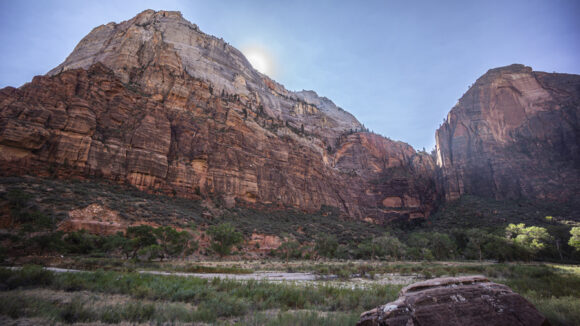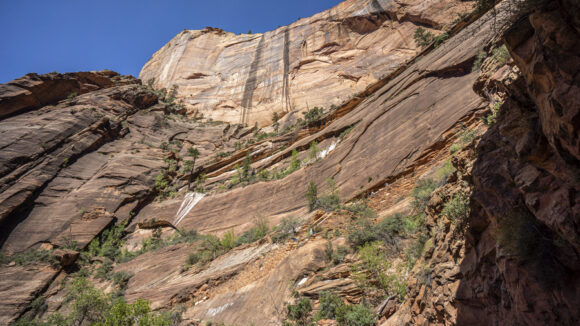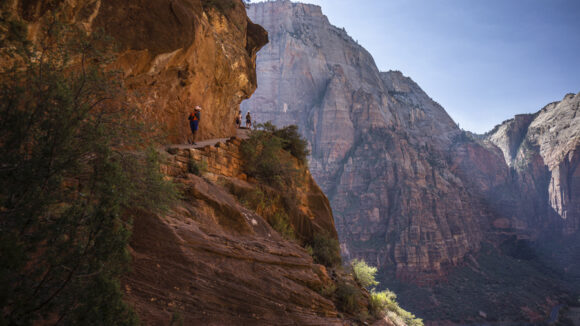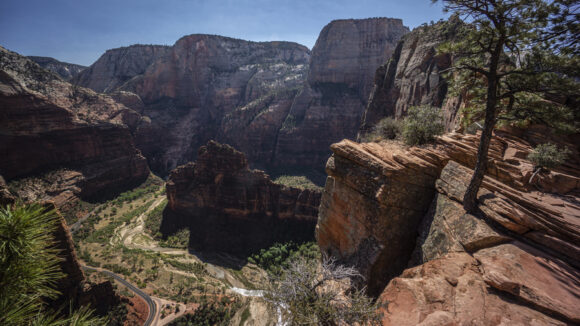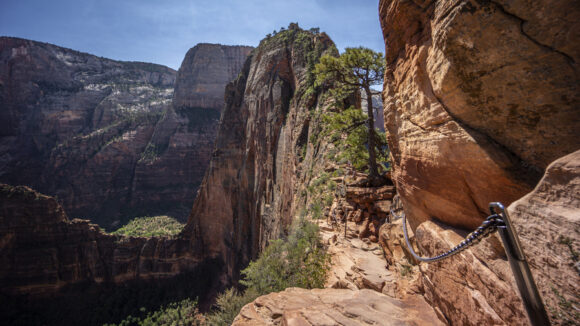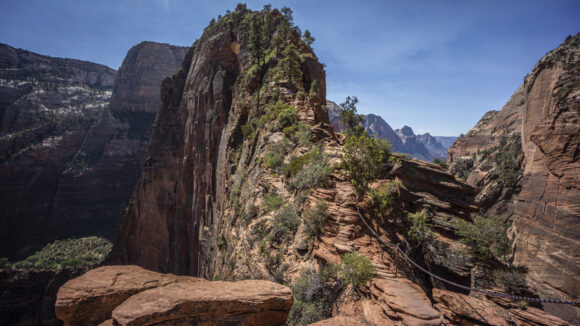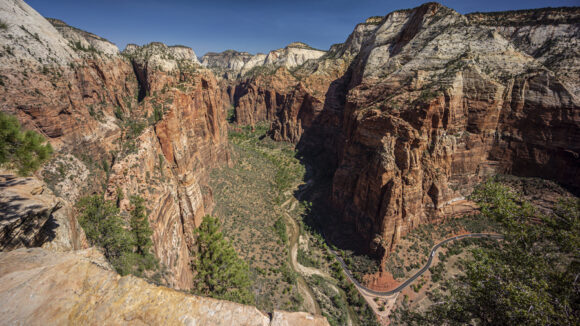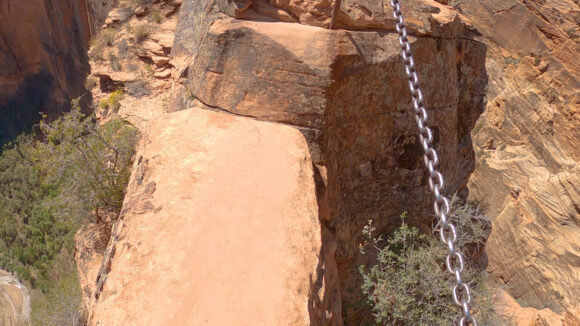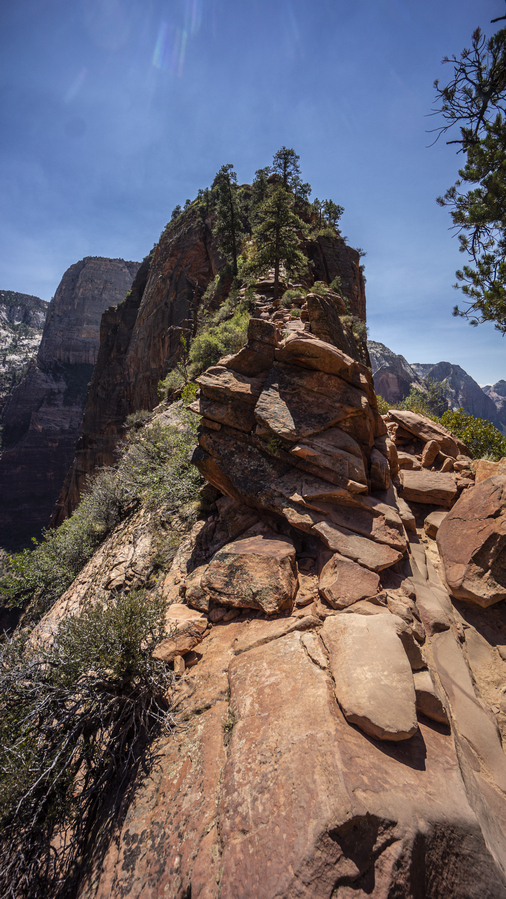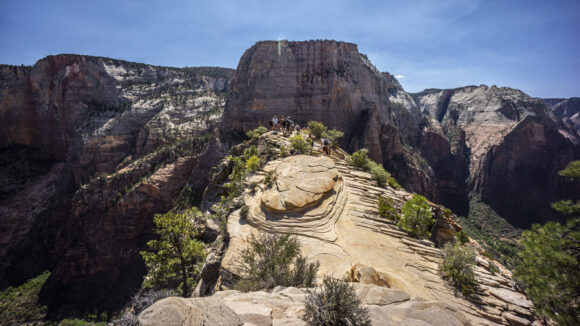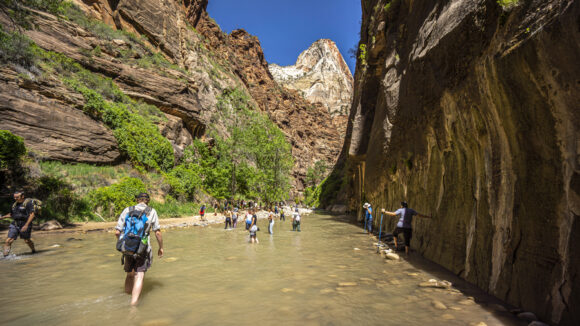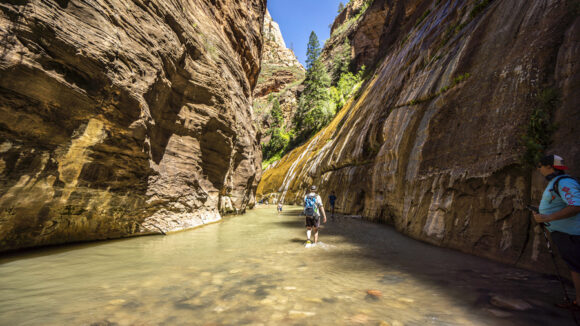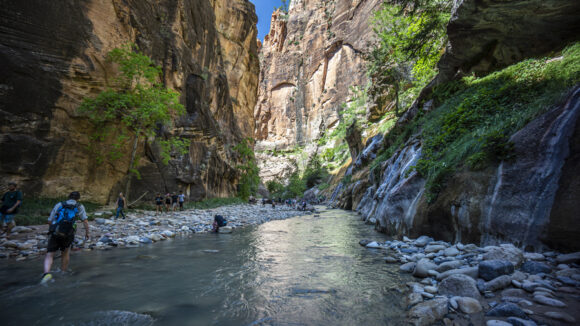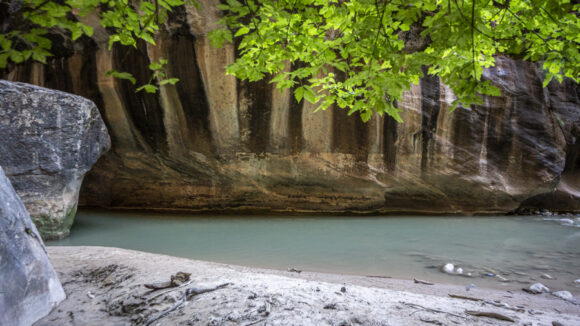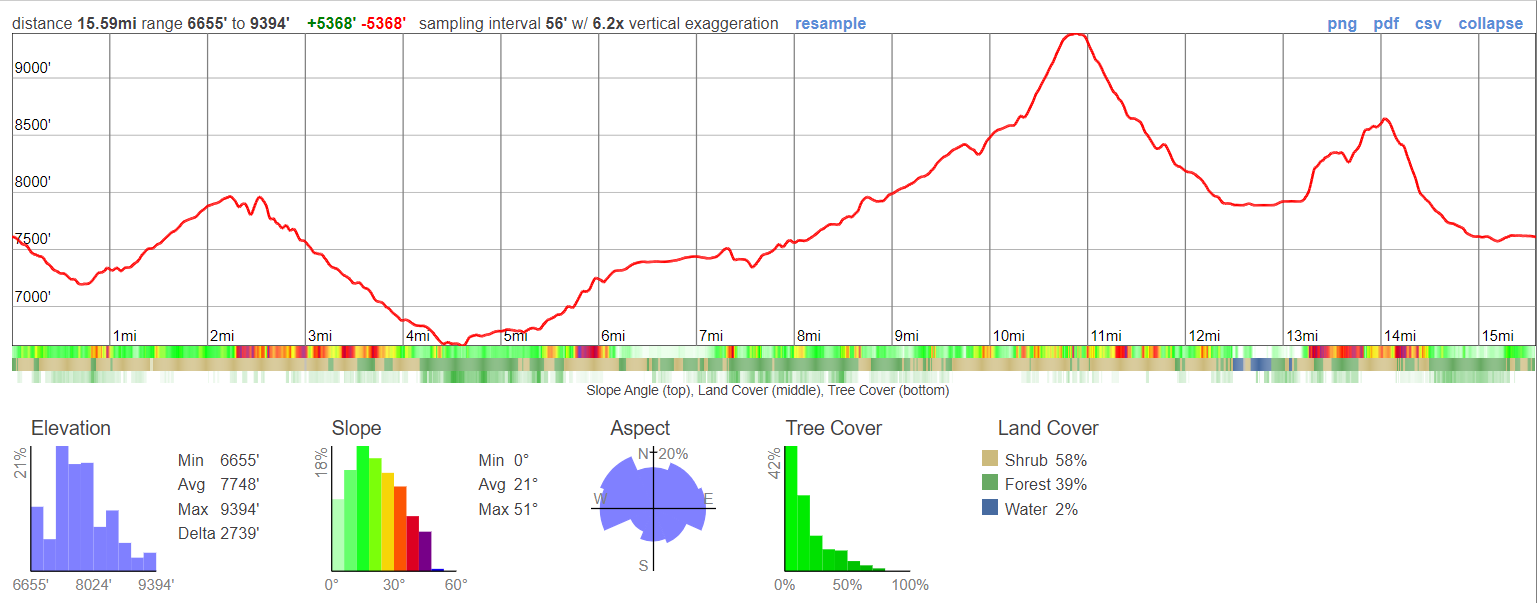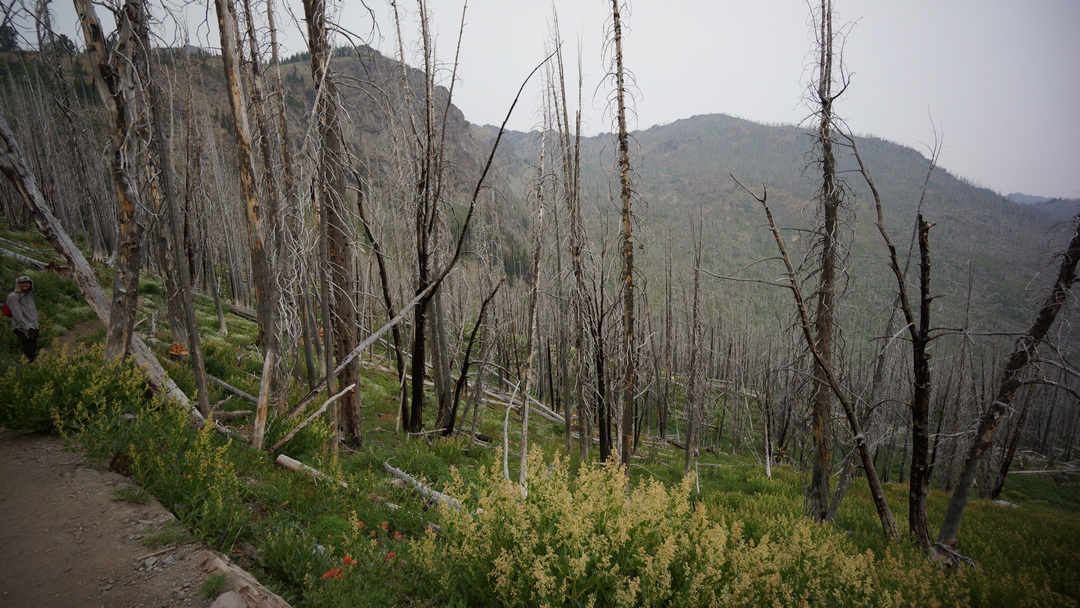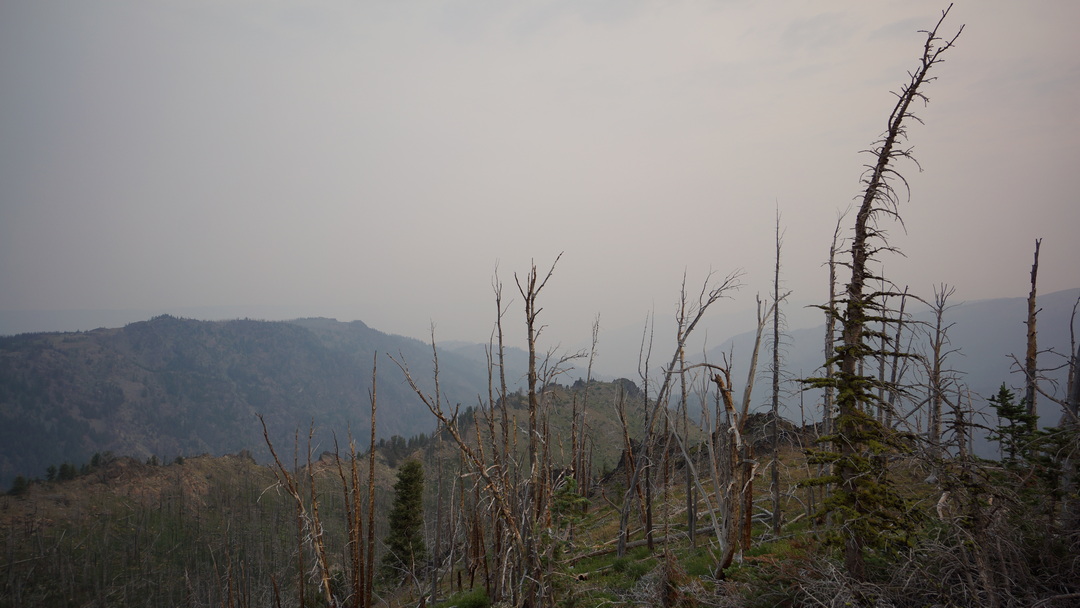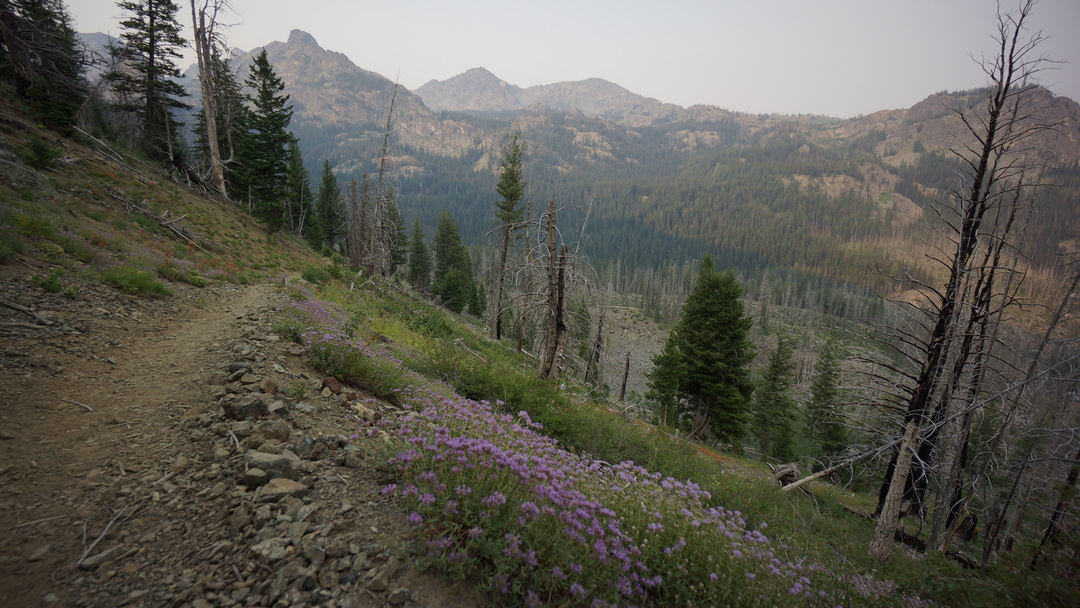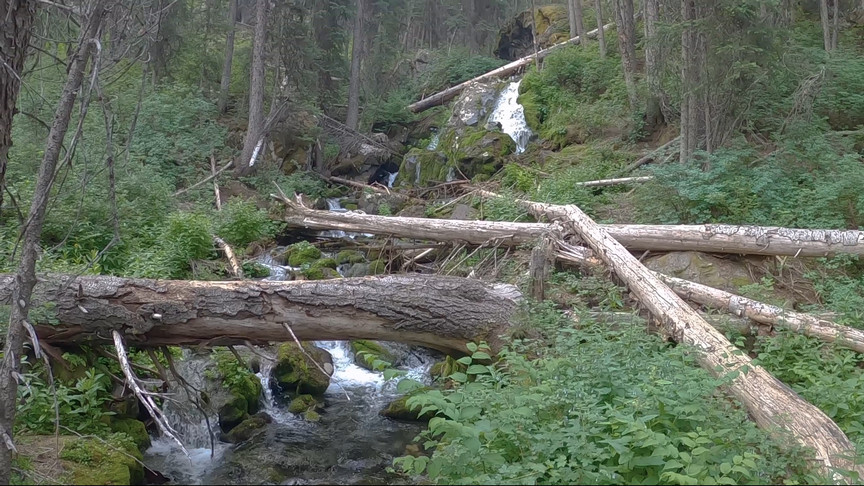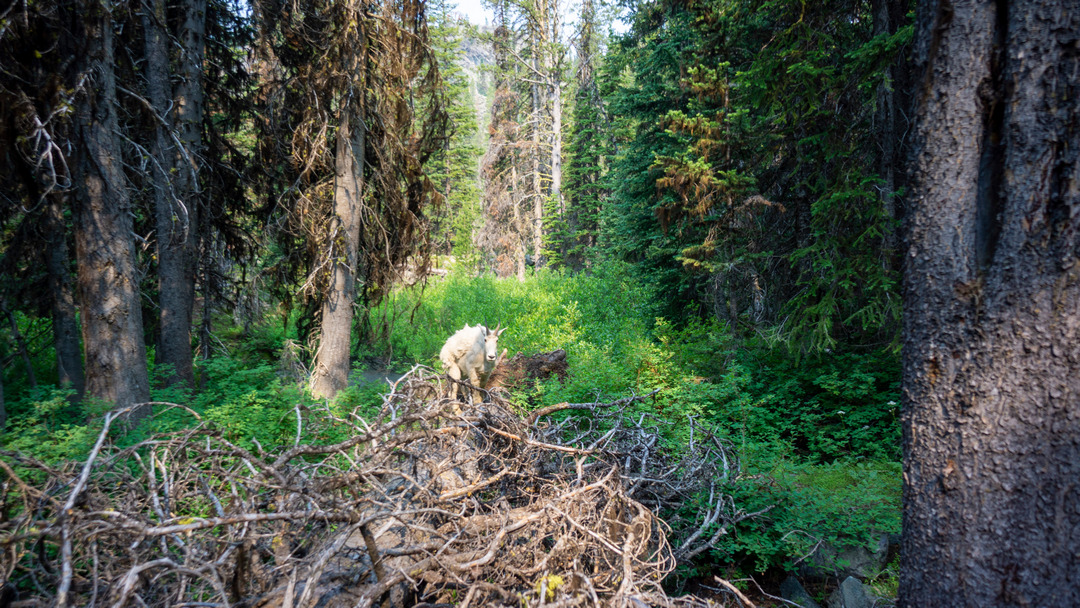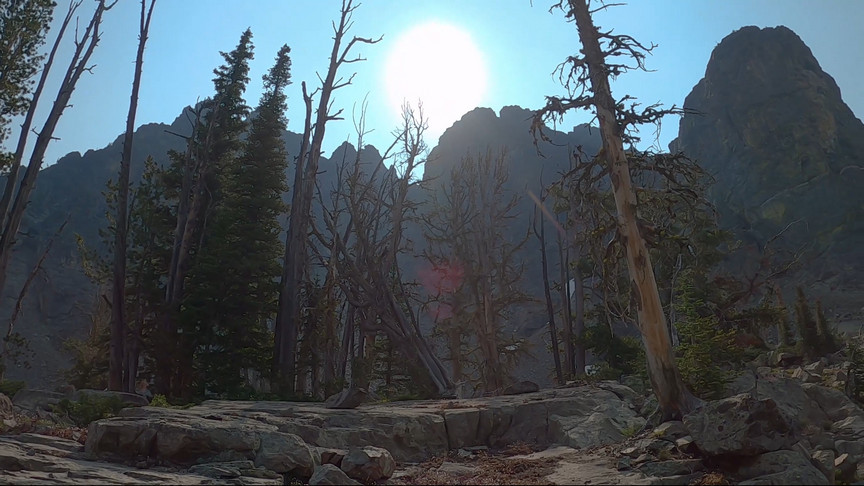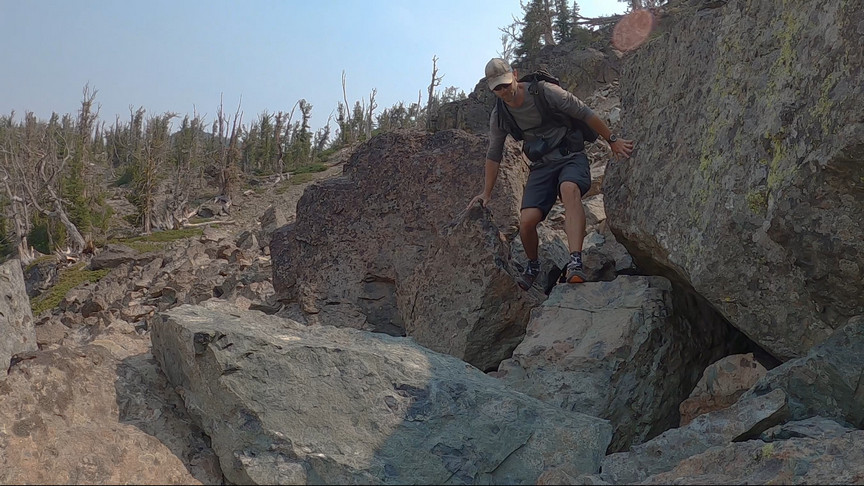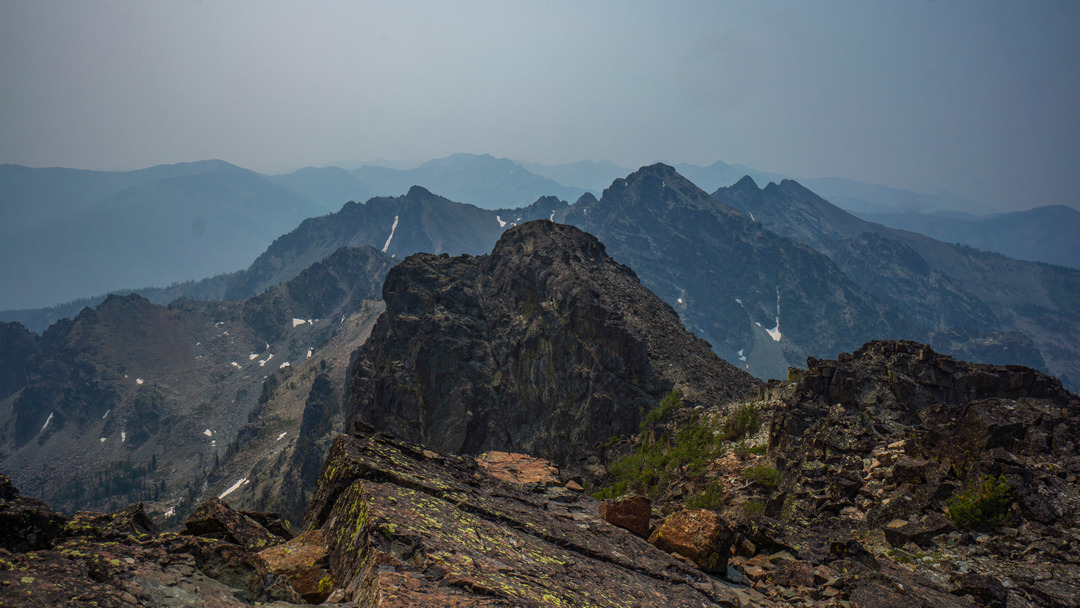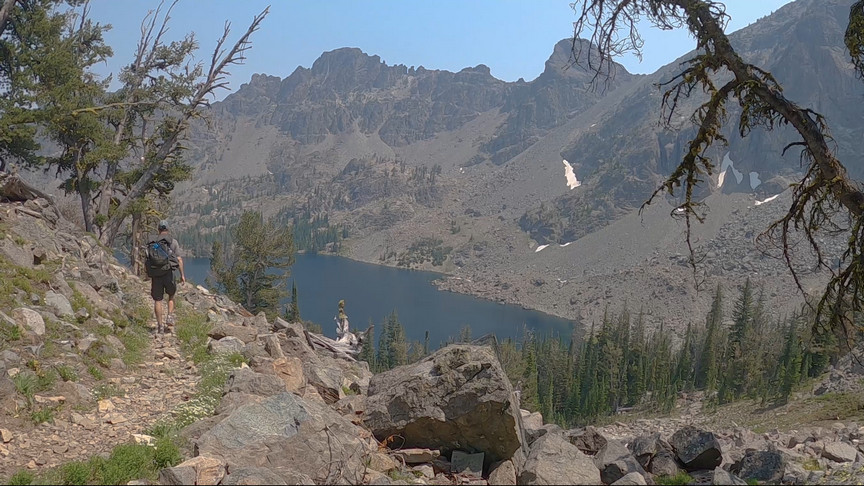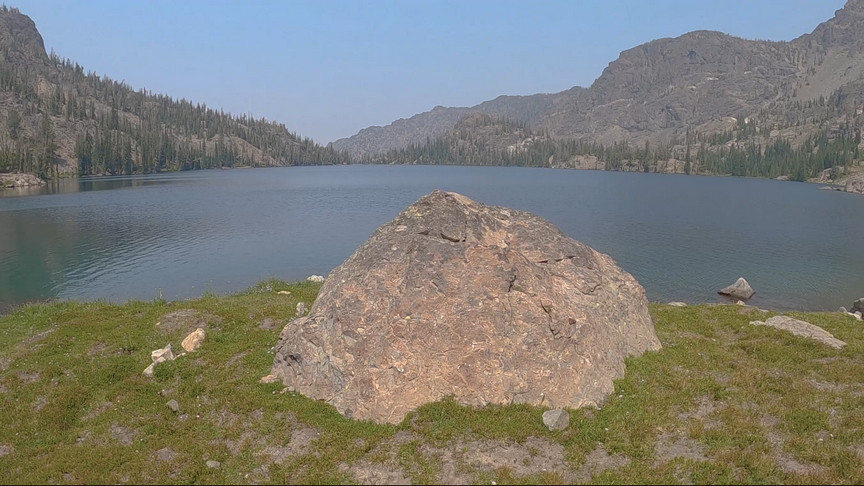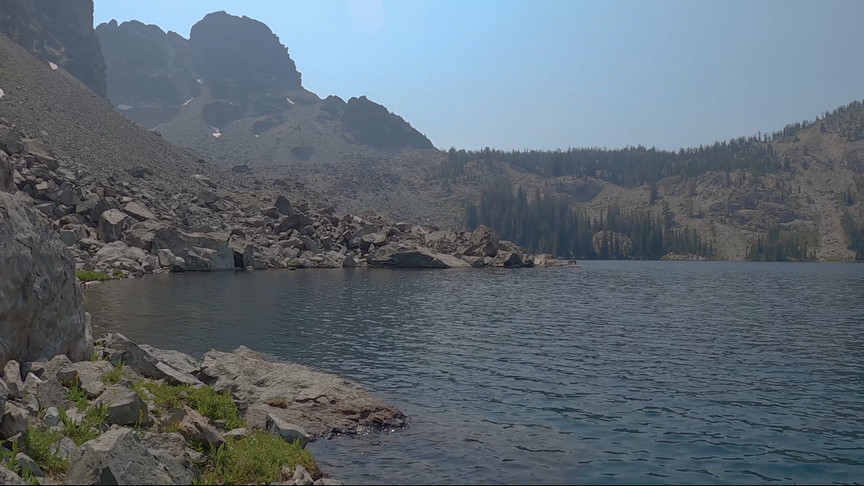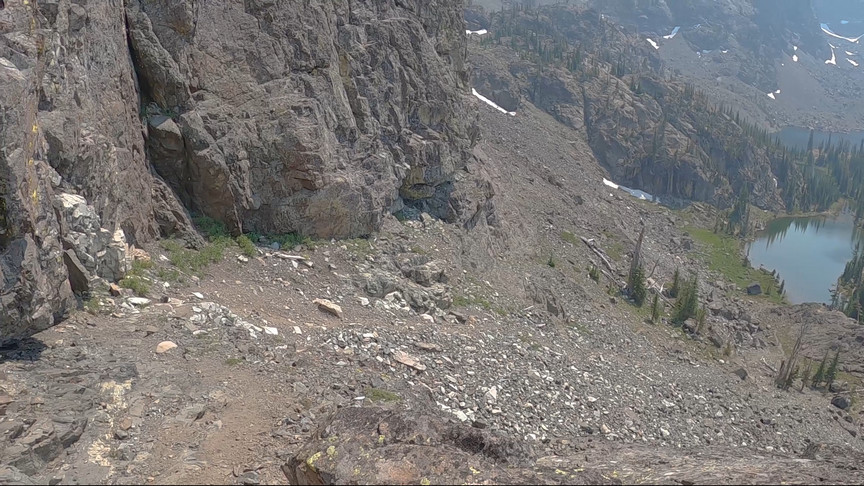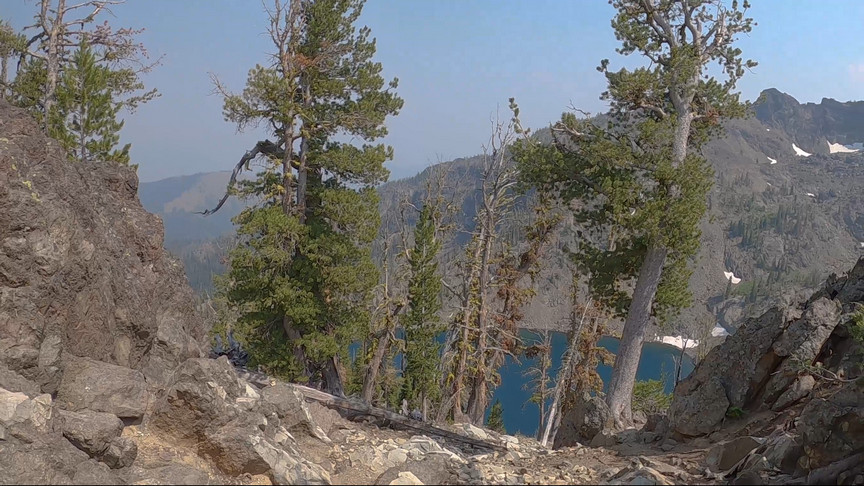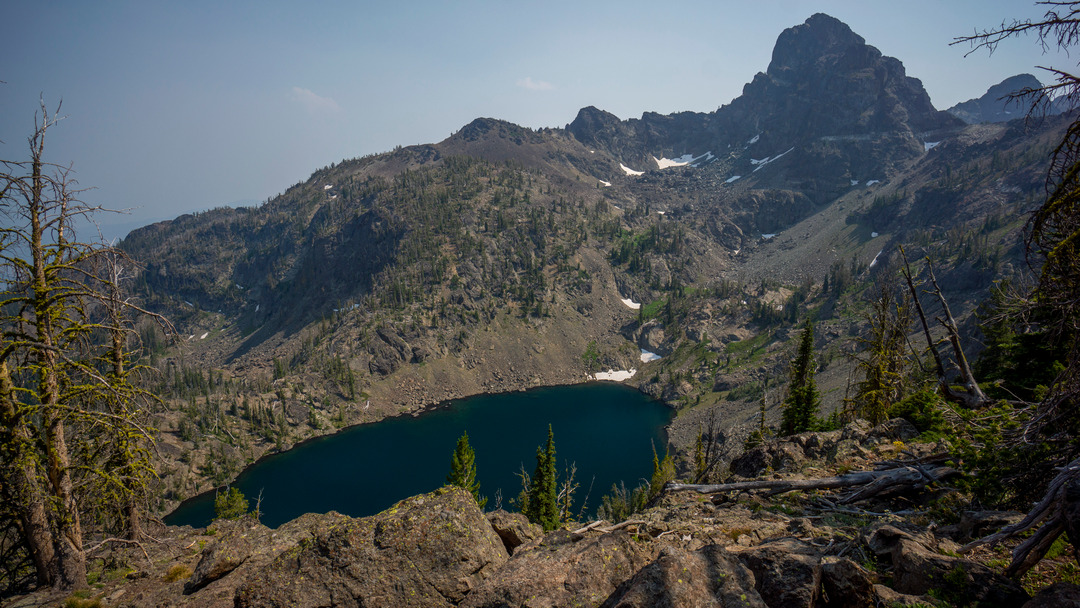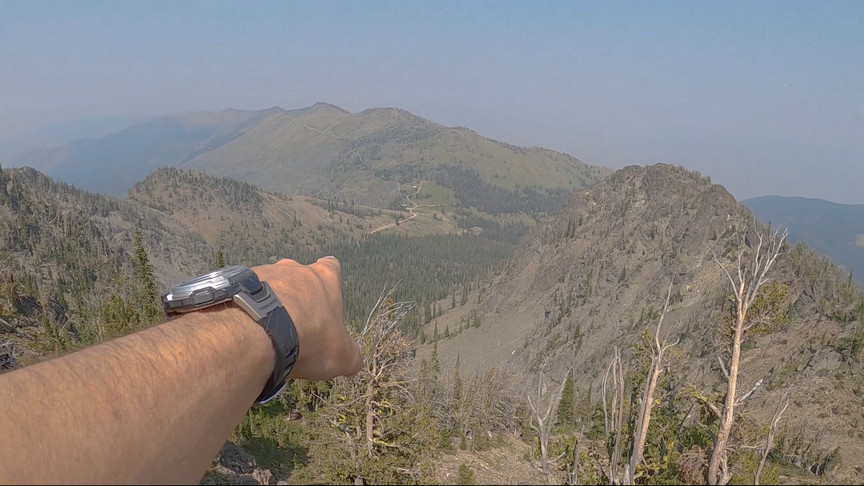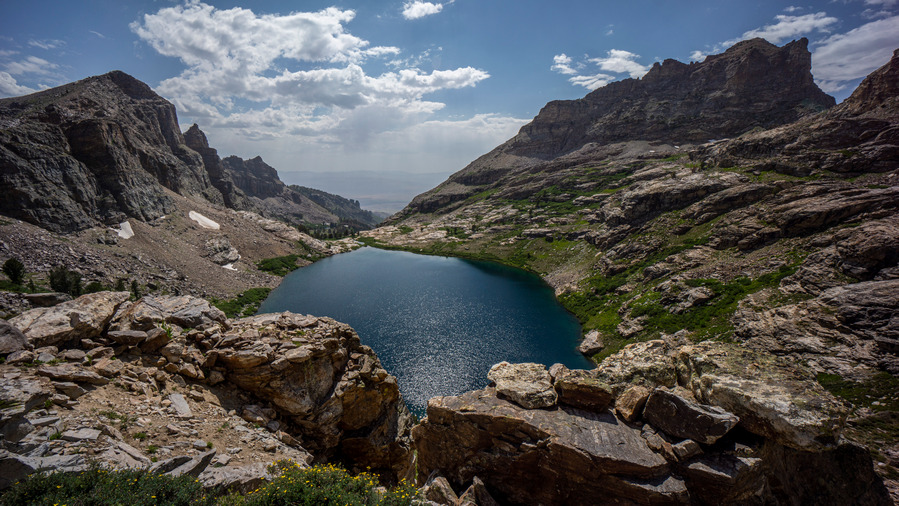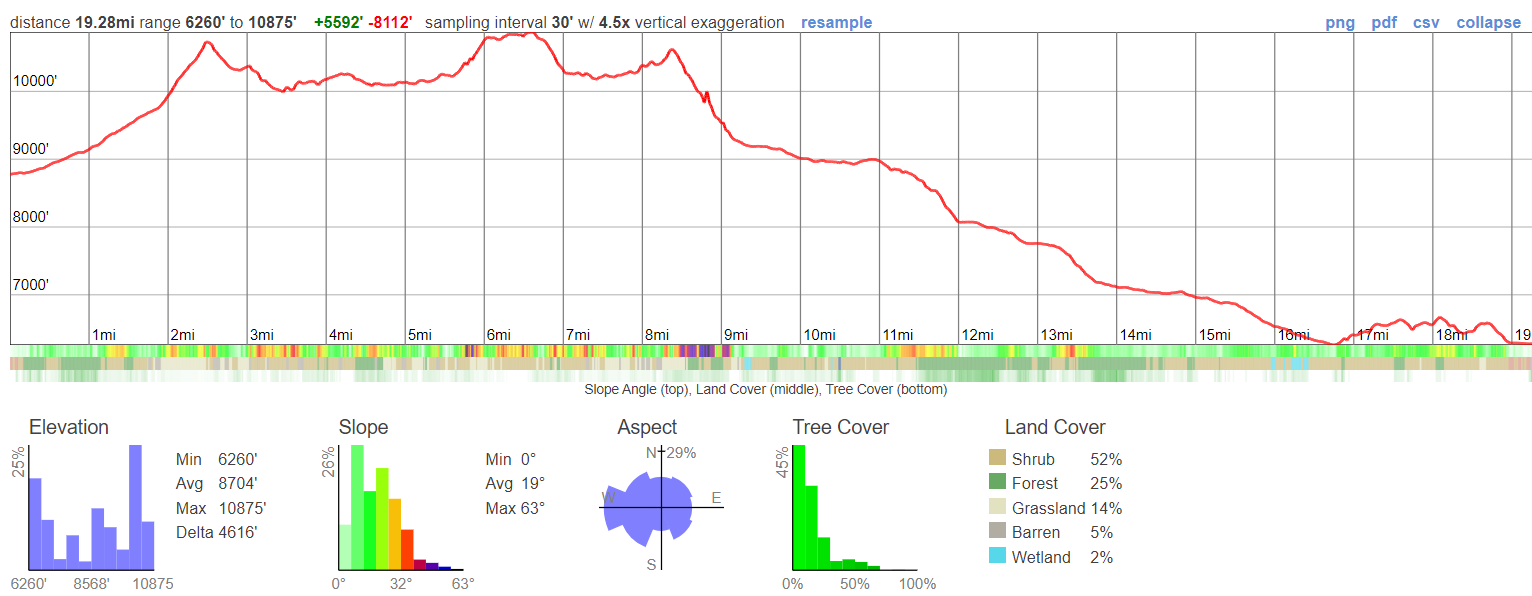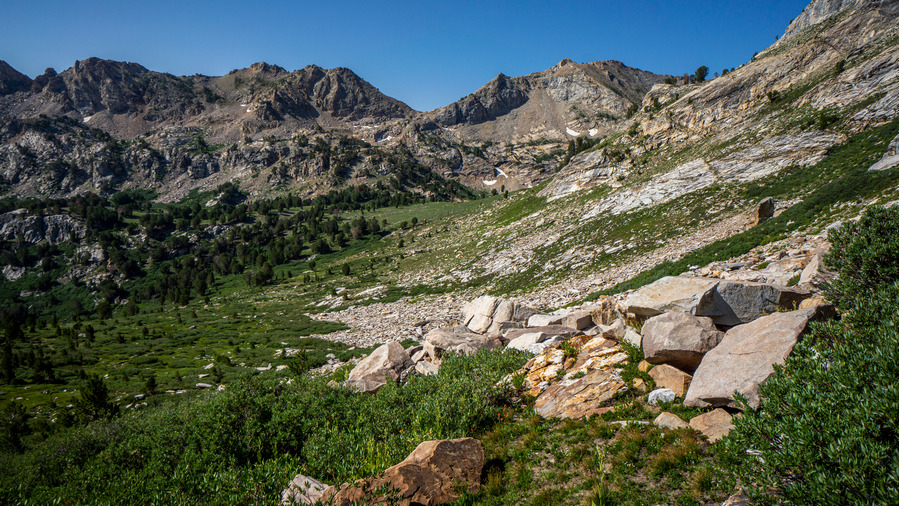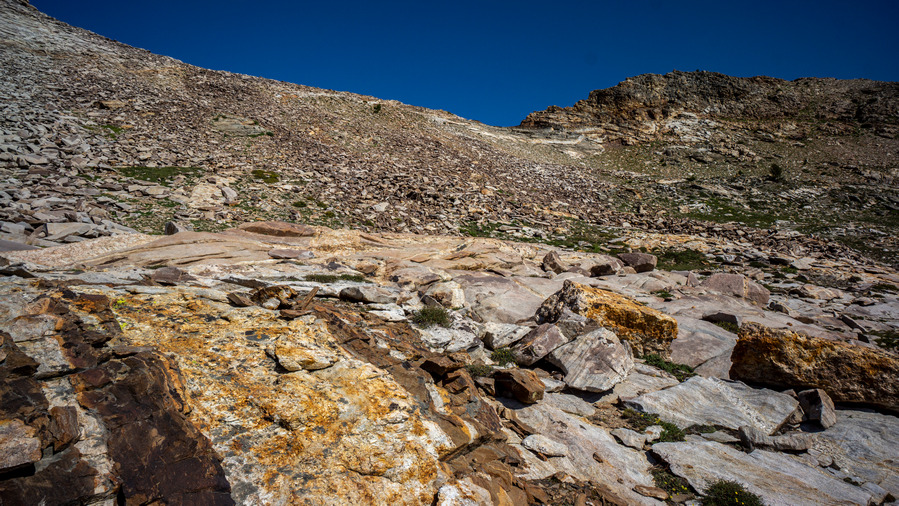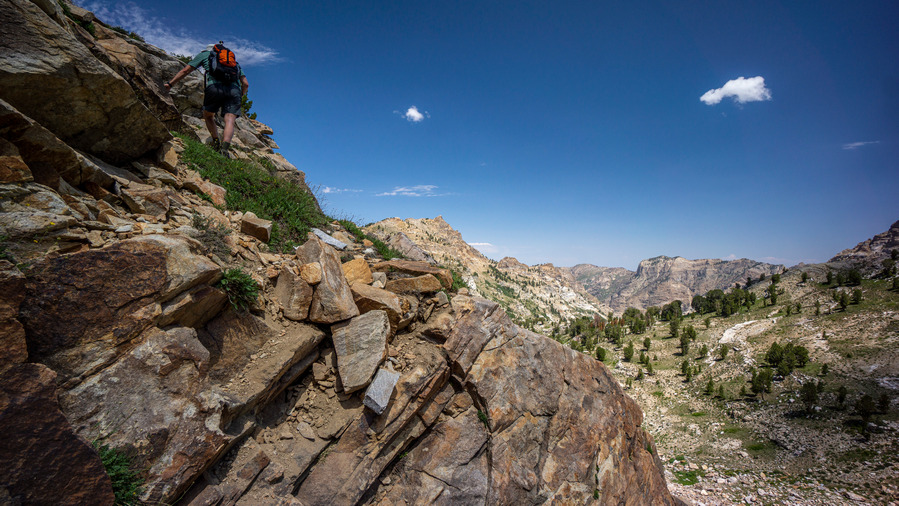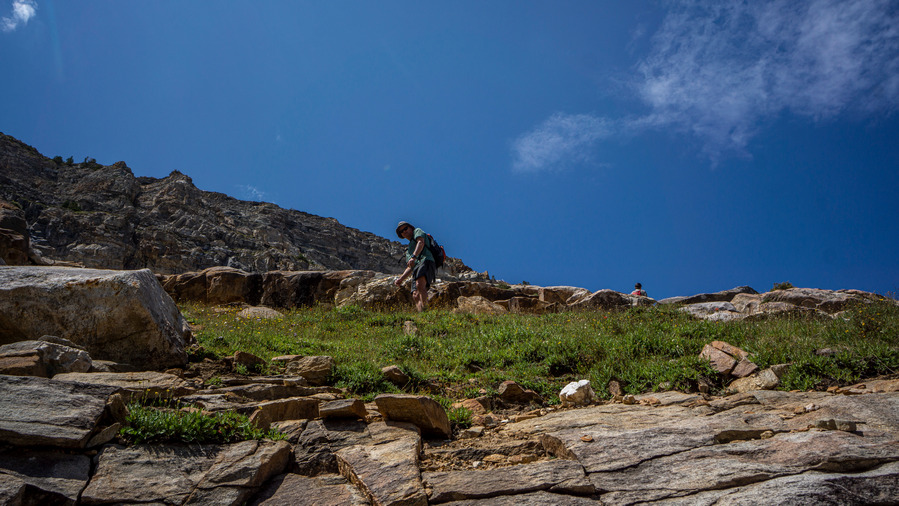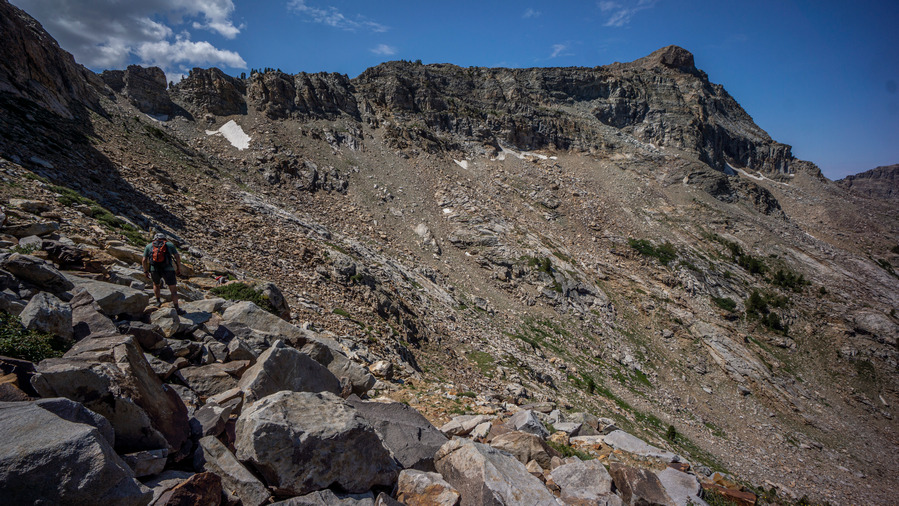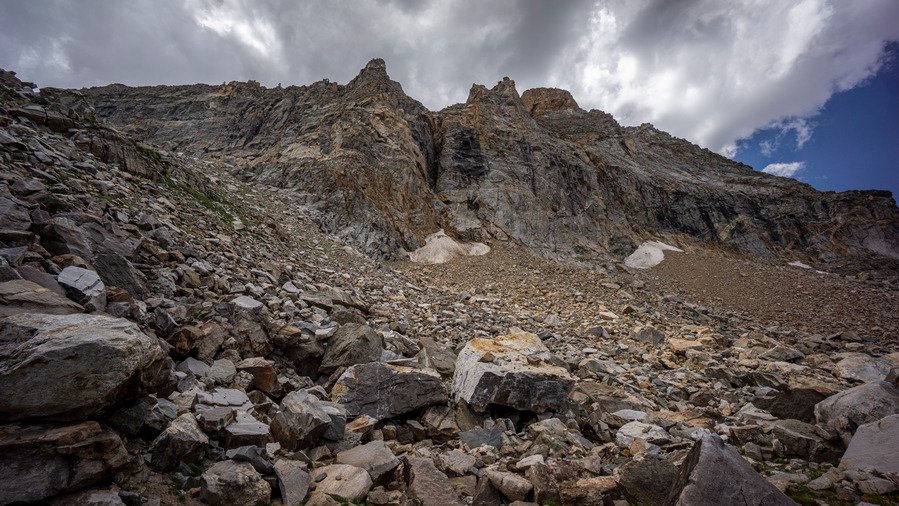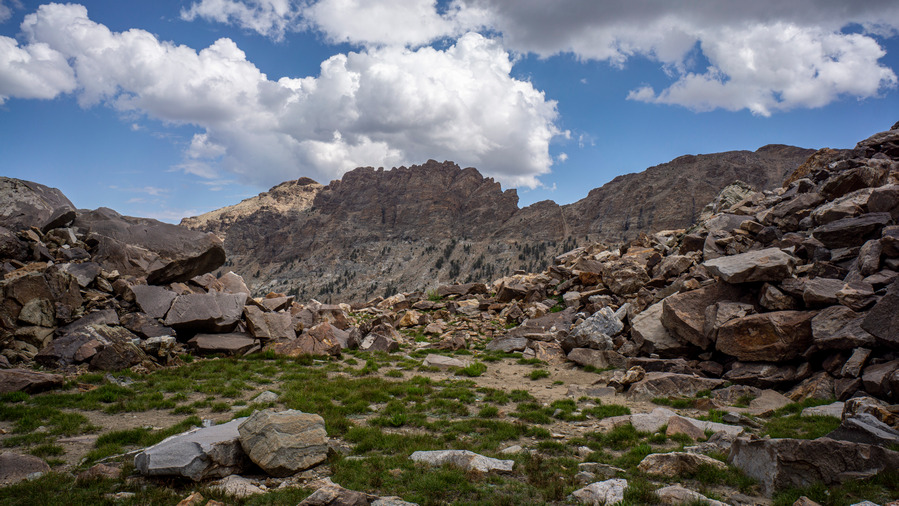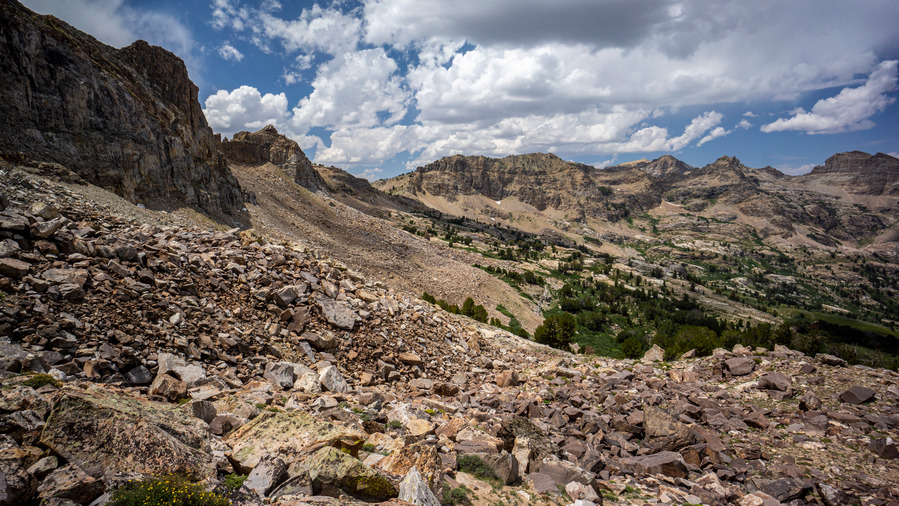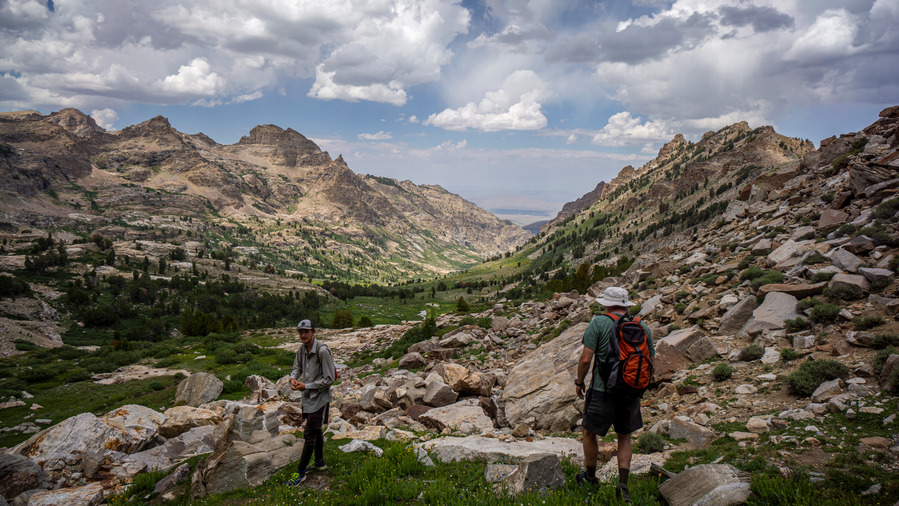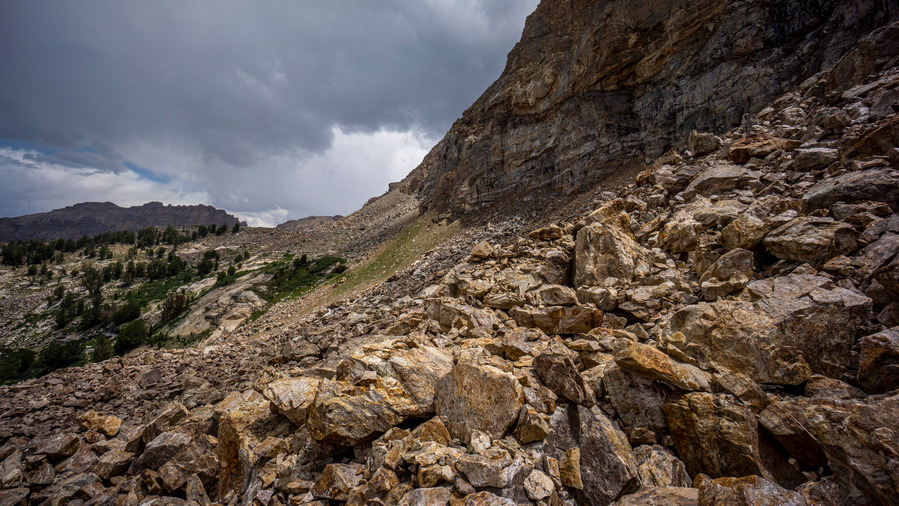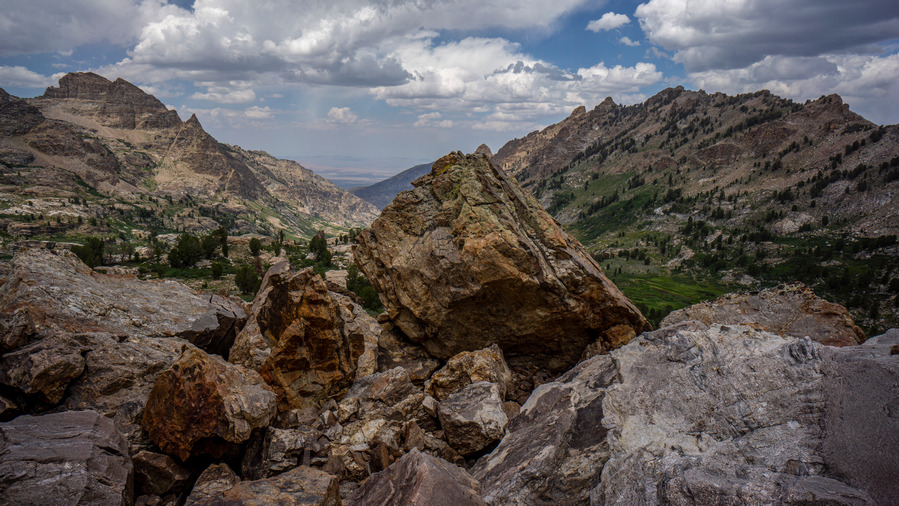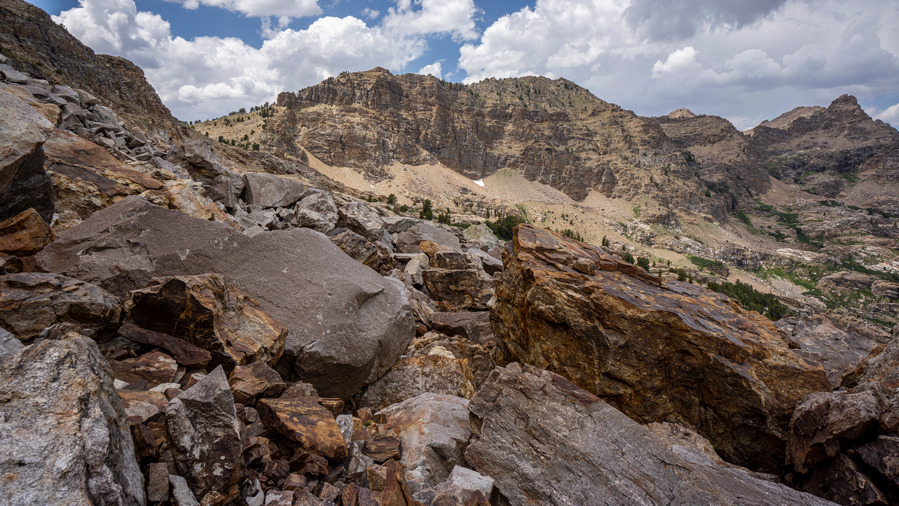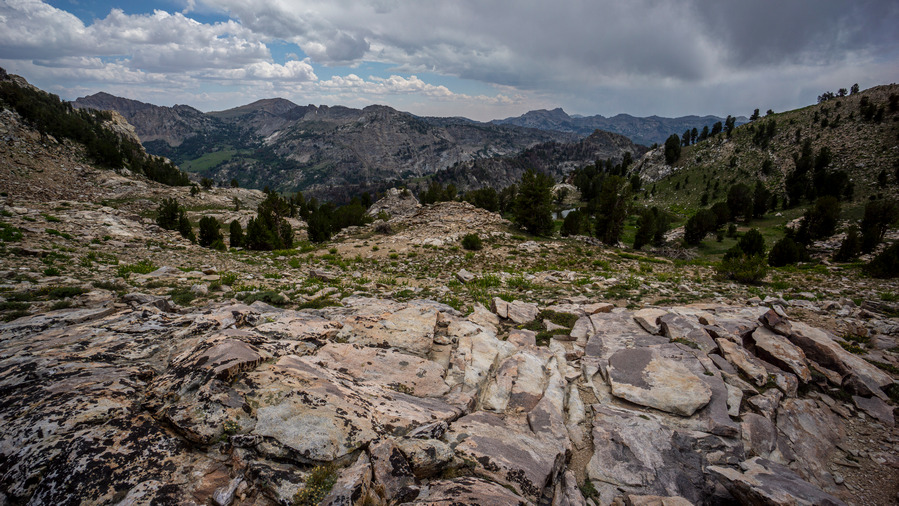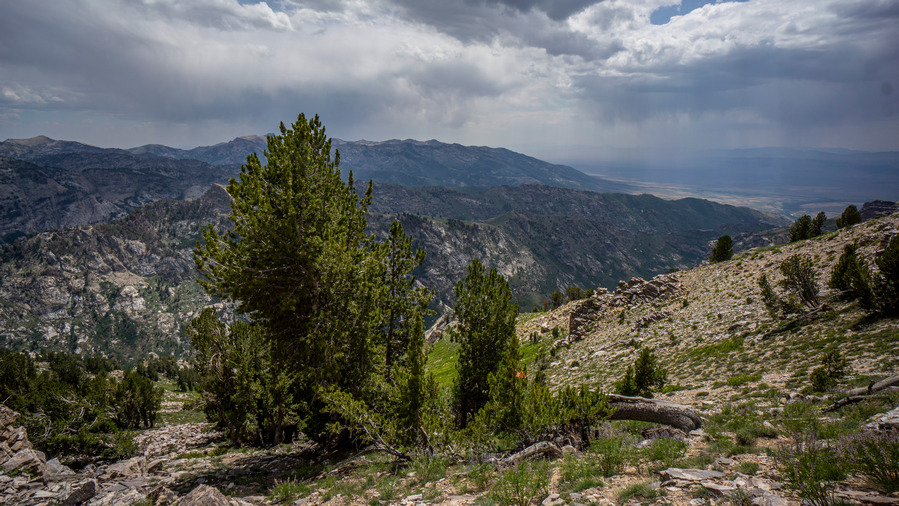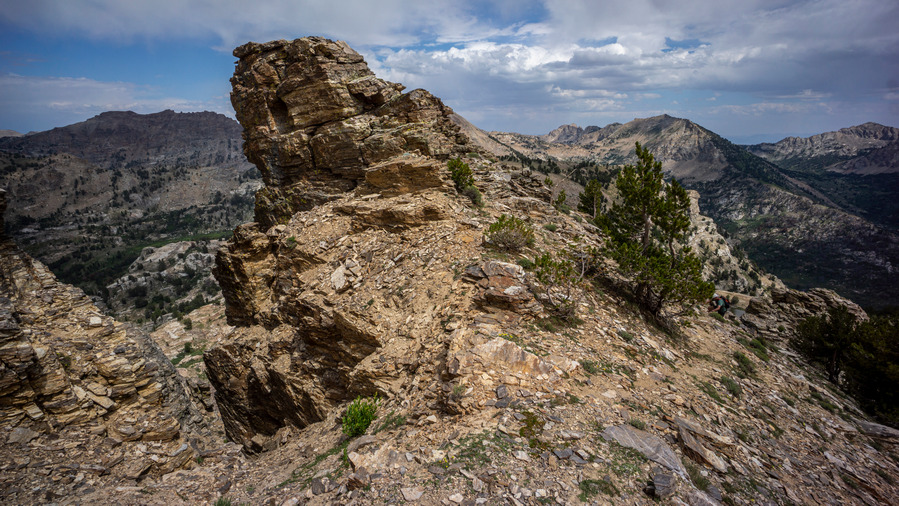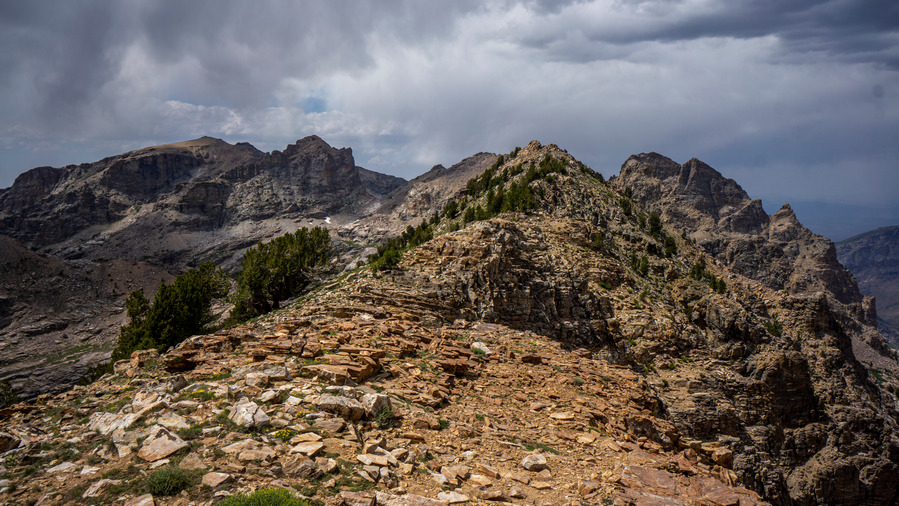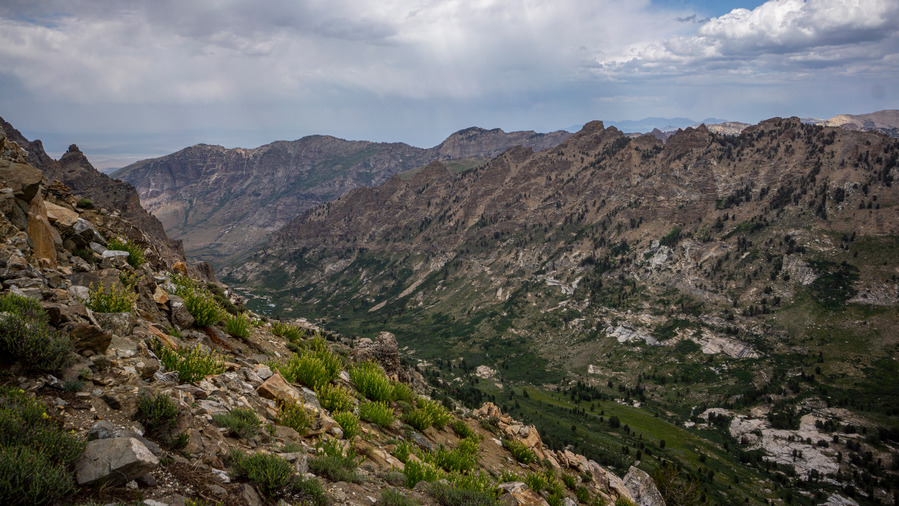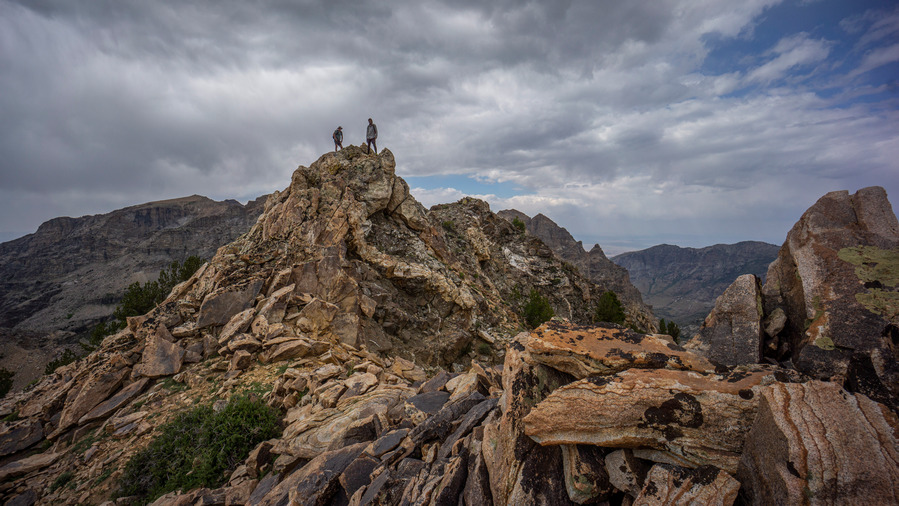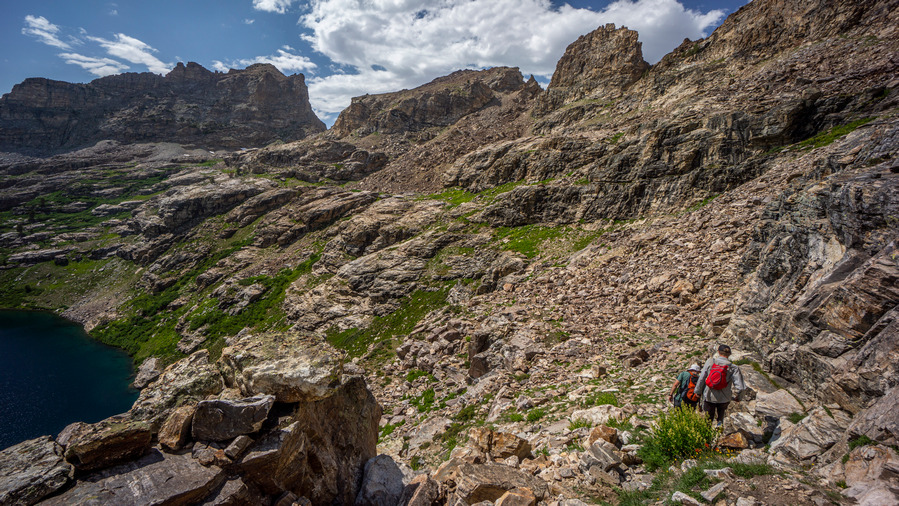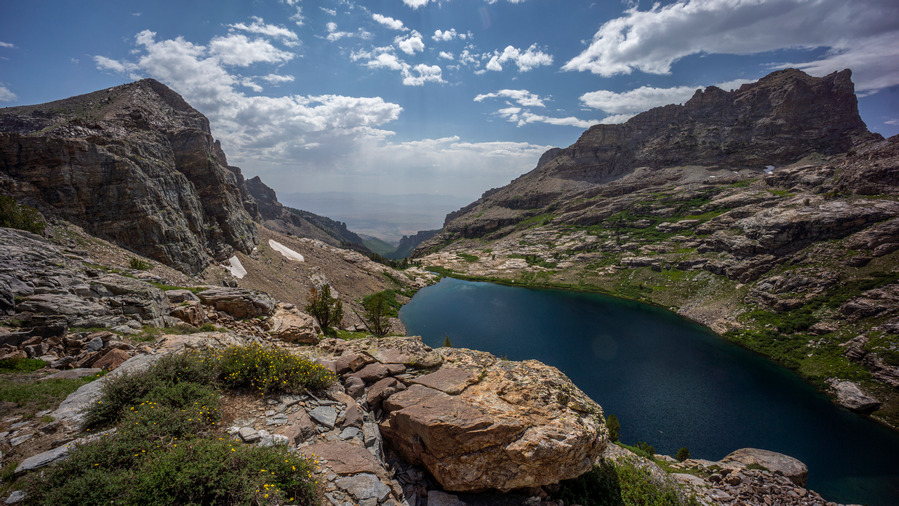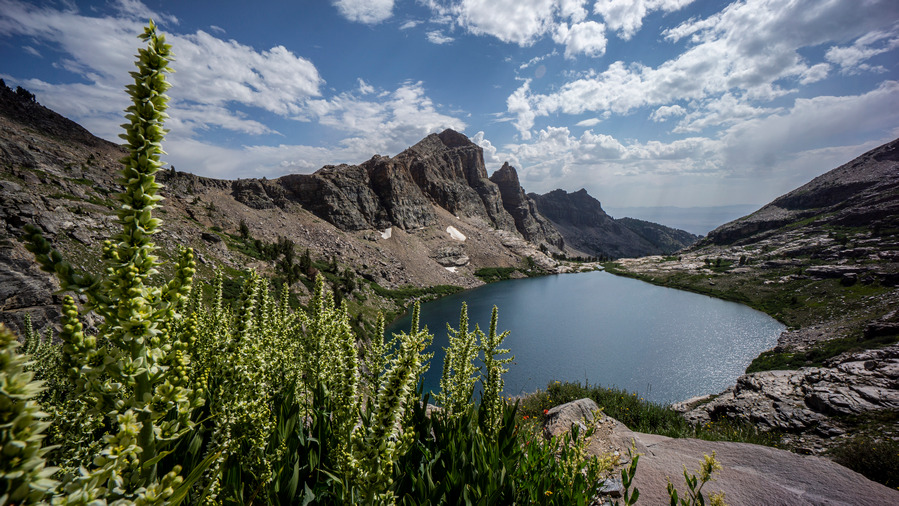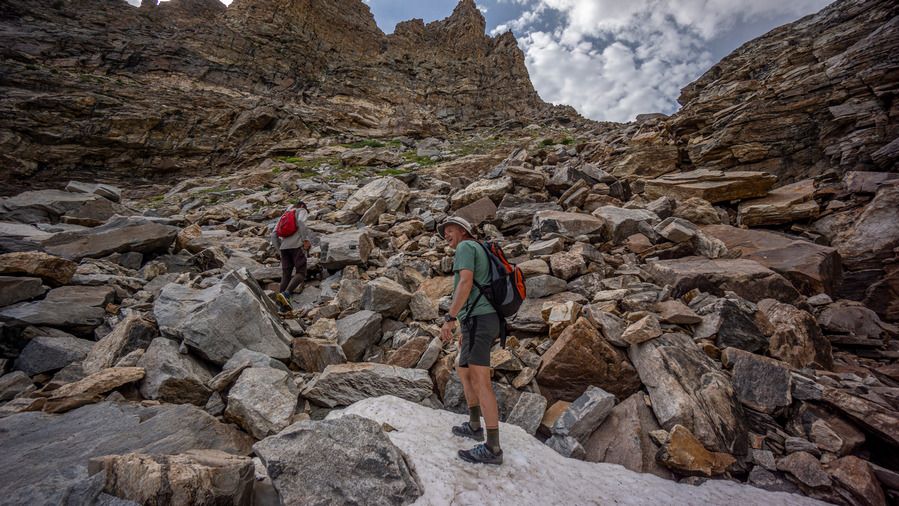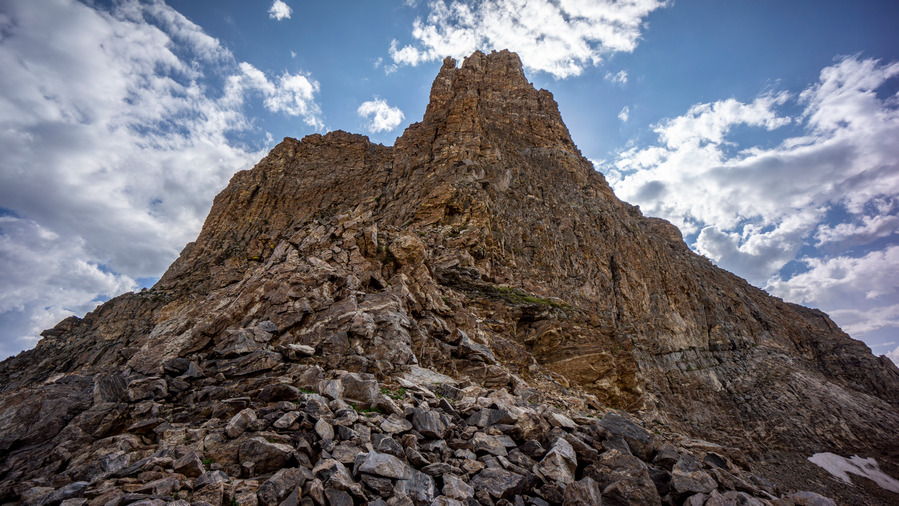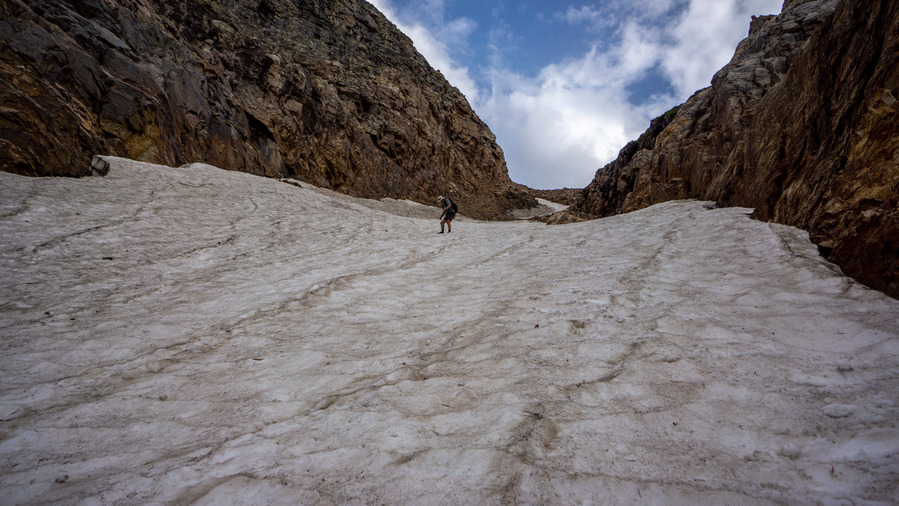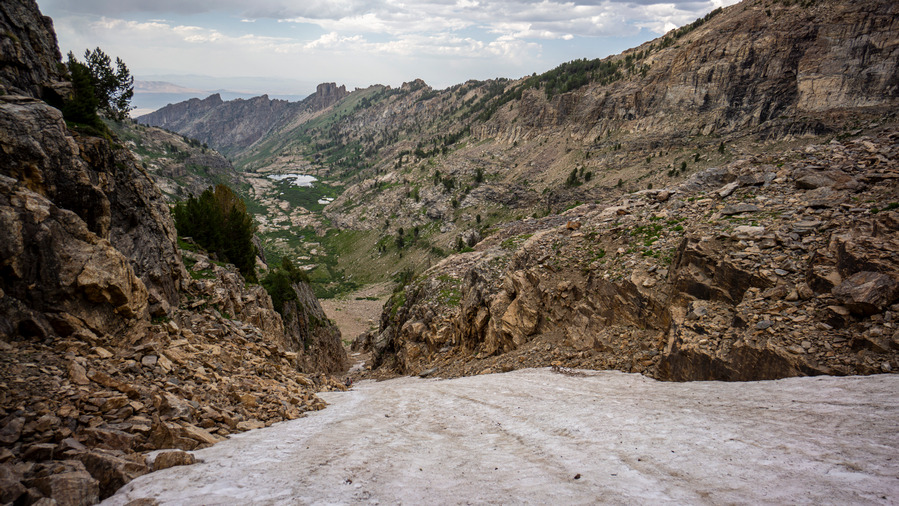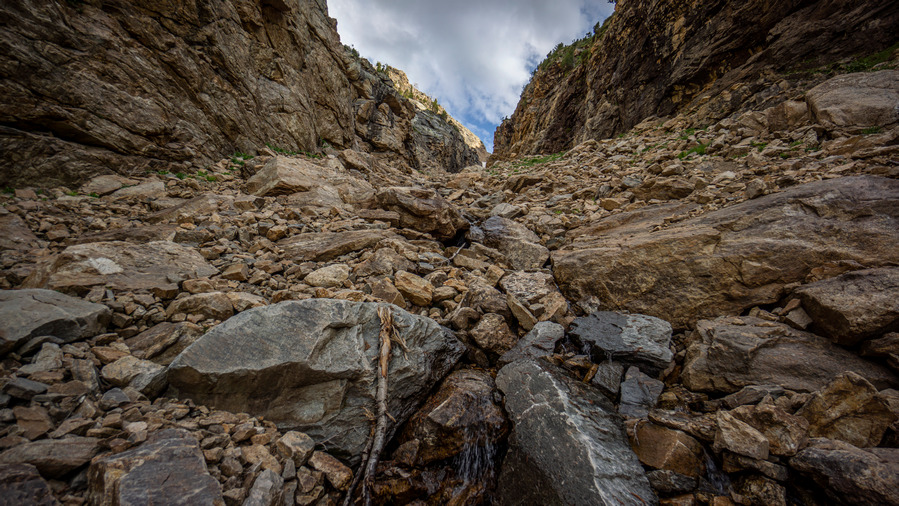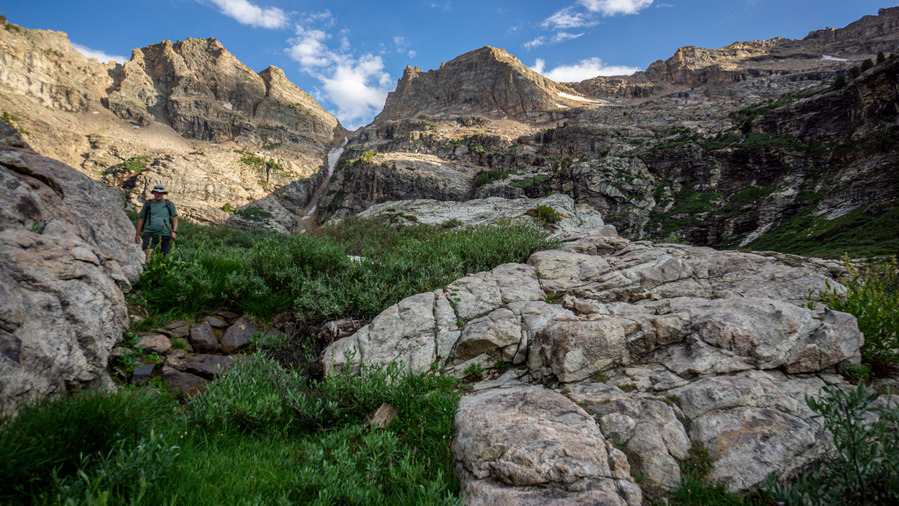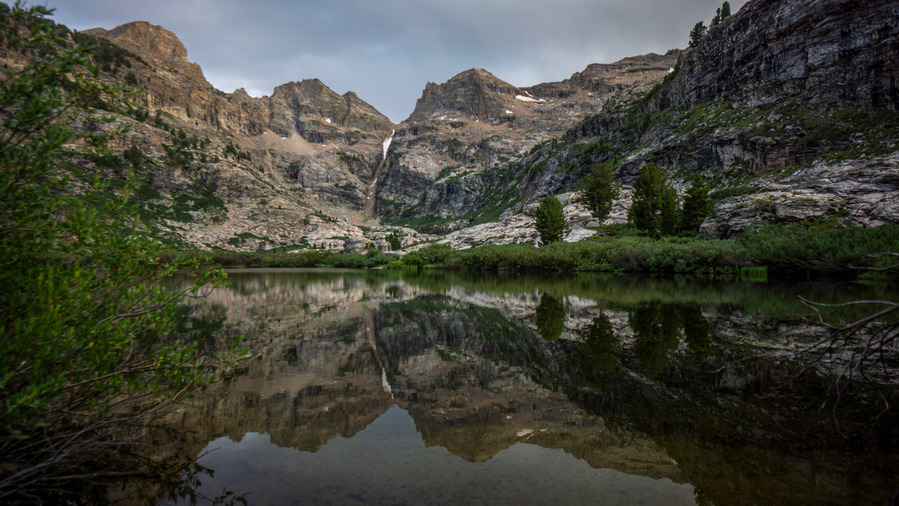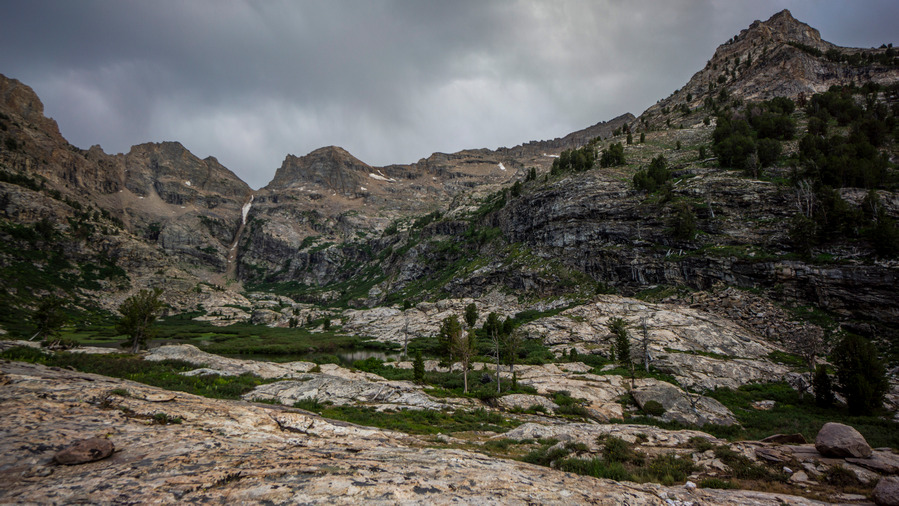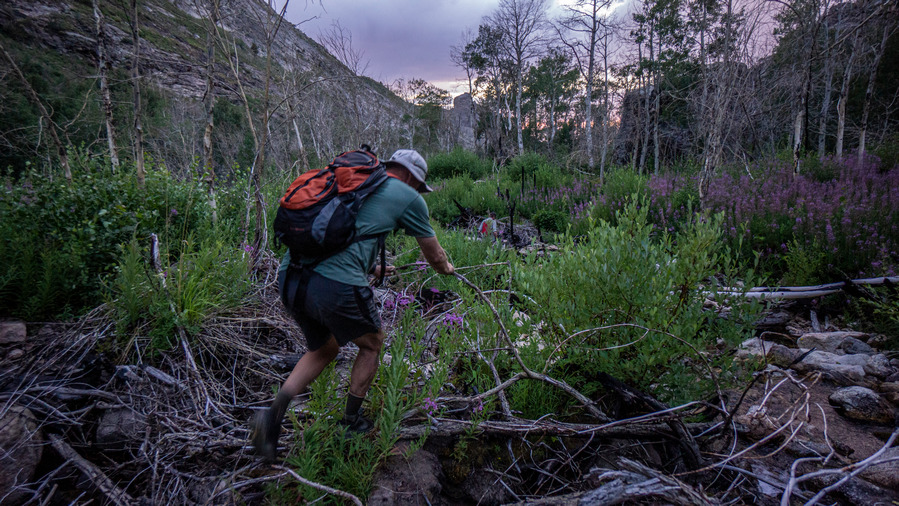Zion National Park – Hiking Angel’s Landing & The Narrows

Hiking Zion National Park: Angel’s Landing Trail & The Narrows
- Hike Location – Zion National Park
- Land Administration – National Park
- Hike Type – Point to Point
- Fees & Permits – $20/person per 7 days, $35/vehicle 7 days, or $80/year annual pass to ALL national parks
- Length Of Time Hiked – 5-6 hours total
- Miles Hiked – 6.78 miles @ Angels Landing, 5.6+ miles @ The Narrows = 12.38 total
- Route Difficulty – 5
- Scenic Beauty – 9.5
- Solitude – 0
Video: Hiking Zion National Park: Angel’s Landing Trail & The Narrows
Map For Hiking Angel’s Landing & The Narrows
Here’s the caltopo map of the Angela Landing Trail and The Narrows hike:
Download GPX file for the Angel’s Landing Trail & The Narrows Hike
Pre-Hike Planning Notes
Zion is a madhouse. If you are used to visiting National Parks, the sheer amount of people here and the quasi-Disney World vibe may be normal to you. It can be a bit overwhelming if you are used to avoiding the crowds, visiting places like BLM land and Wilderness areas. But this is Zion, remember? Zion!
Here’s the deal: you can’t drive in Zion. Huh? Yeah, crazy, I know. The visitation to this park is so high now that they have visitors park their cars outside of the park itself, and take shuttle buses into the park. Well, you CAN drive through part of the park, but public access ends at the Canyon Junction. Visitors must either take the shuttle up the canyon or go on foot, bike, or horseback. This is supposed to help reduce traffic congestion. So, you have to find a place to park outside of Zion. Fine. Where? There are a few stores that allow you to park on their property if you buy $20 worth of items from the shop. For many, you were likely going to spend $20 somewhere, so might as well get a parking space out of the deal. There are other paid parking lots and spaces throughout the town of Springdale.
Now you walk or take a shuttle bus to get to the entrance of Zion National Park. This is a free shuttle. Here, you will need to purchase your entrance pass, if you don’t already have an annual interagency pass. Then, you wait in line to get another shuttle bus that takes you into the park. This shuttle is also free. Buses come every 10-15 minutes.
Once in the park, the shuttle bus drives around and makes stops at 9 preset locations. Get off at the stop you wish to explore. When you are done at that location, you can hop back on the shuttle which will take you to any of the other stops along the shuttle route.
There are not many dispersed camping opportunities outside of Zion National Park and the surrounding communities of Springdale, Rockville, Grafton and Virgin. However, we did find a suitable spot for my camper van along Kolob Terrace Rd a few miles before the Zion park entrance.
When I hiked Angel’s Landing in 2021, there was no permit needed. Now, new for 2022, a permit is needed to hike Angel’s Landing. It’s a lottery system, with a seasonal and “day before” lottery. It costs $6 to enter the lottery. Read more on this here: https://www.nps.gov/zion/planyourvisit/angels-landing-hiking-permits.htm
Hiking The Angel’s Landing Trail
We rode the Zion shuttle bus into the park and stopped at The Grotto, stop #6. Angel’s Landing Trailhead is across the street from the shuttle parking lot.
We walk across a bridge that spans the Virgin River. It’s late August, and the flow is quite low. On the other side of the bridge is a paved pathway. Paved! Only the finest for the Angel’s Landing Trail. There are many other people hiking in both directions. The view quickly opens up to a view of Angel’s Landing’s sheer south side. Impressive.
The pathway leads us to the base of a sheer rock wall, which would be pretty much impossible if it weren’t for the switchbacks cut through it. The mad-made path snakes it’s way up the rock wall at a very easy-to-hike grade.
At the top of the climb, we enter Refrigerator Canyon. Here, the trail runs through a deep and very straight canyon for a half mile. Then, another set of switchbacks begin.
After climbing the switchbacks, we reach Scout Lookout. A ton of people are gathered here; resting, or perhaps, not going any farther. The views are excellent, overlooking Zion Canyon, the Virgin River and a 360 degree view of incredibly beautiful mountains. Along with the deeply carved canyons, the color of the mountains in Zion is what makes them unique. They seem to display a rainbow of colors, from red, orange and pink to white and green.
Scout Lookout is basically the saddle along the ridgeline before the big ascent to the top. The perspective here, the angle at which you see Angel’s Landing from, is truly incredible. Everything about it is attractive; the sheer rockface, the knife edge, the backdrop, everything.
Now the trail gets funneled down to an occasional knife edge. There’s a chain to hold onto along the way, if needed. Even on this thin knife edge, there are still trees growing from the rocks, eeking out an existence here. Remarkable.
The summit of Angel’s Landing is a broad, flat top. Many people are congregated here. The views are excellent, and this is the obvious spot for a lunch break. Great views of Zion Canyon. It’s a bit of a shame to have such a beautiful place marred by the existence of the road through Zion Canyon though. The buses can be see and heard pretty much non-stop from Angel’s Landing.
After 20 minutes at the top of Angel’s Landing, we start the descent down. We make good time going down, following the same trail back to the trailhead at The Grotto.
Hiking The Narrows
Leaving The Grotto at shuttle stop #6, we ride the shuttle to stop #9, The Temple of Sinawava. It’s early afternoon now, and it’s a Saturday… there are a lot of people here, seemingly even more than Angel’s Landing. Many people have these special water shoes on, the kind the tourist companies rent. Save your money, these are not needed here. Just wear your normal hiking shoes in the water (you wear trail runners, right??), and a pair of gaiters helps keep the debris out of your shoes.
It’s a short walk from the shuttle stop down to the Virgin River. Zion Canyon begins to narrow here, and the name “The Narrows” suddenly comes to life. We take our first steps in the water, which is surprisingly a pretty comfortable temperature. There is no “trail” to follow, you simply hike upstream. Walk through water, rocks, sandbars and outcrops of dry land.
Not far upstream, the canyon walls narrow considerably and the walls become “slabby”. Waterfalls pour down these slabs right into the Virgin River. That’s pretty cool.
Around each bend in the river, the lighting changes. Sometimes we’re in the sun, sometimes the shade. The top of the cliffs are 1,000ft above the river, more if you include the summits behind them, out of sight. It’s a stunning place to be.
We pass Mystery Canyon, Mountain of Mystery, and reach the junction with Orderville Canyon. It’s getting late in the afternoon, and this is where we decide to turn around and head back. We’ve hiked 2.8 miles to this point, so it should be 5.6 total round trip.
Hiking The Narrows was cool, but crowded. Too crowded. It makes me want to explore some of the lesser visited parts of the park if and when I make it back to Zion.
Seven Devils Mountains, Idaho – He Devil Summit Hike (July 2021)
Seven Devils Mountains, Idaho – He Devil Summit Loop Hike
Watch the He Devil Summit Hike Video On Youtube
- Hike Location – Seven Devils Mountains, Idaho – Hells Canyon Wilderness
- Land Administration – Hells Canyon National Recreation Area, managed by the Wallowa-Whitman National Forest
- Hike Type – Loop
- Fees & Permits – No fees or permits needed
- Trailhead – Windy Saddle
- Length Of Time Hiked – 1 day
- Miles Hiked – 15.56
- Route Difficulty – 7.5
- Scenic Beauty – 8
- Solitude – 8
Video: He Devil Summit Loop Hike – Seven Devils Mountains, ID
Pre-Hike Planning Notes
There are no fees or permits required to hike in the Seven Devils Mountains. The road up to Windy Saddle is doable by car, but it’s a bumpy ride in places with a lot of washboard roads. There are a lot of steep inclines, your vehicle will be working hard to get up here. There is a FREE campground a half mile from the Windy Saddle Trailhead called the Seven Devils Campground. This is a great place to stay the night before your hike, if doing a day hike, or perhaps the night after finishing your hike. There is no water up here. There are pit toilets at the campground and the trailhead.
He Devil Summit Hike Maps
Here’s the caltopo map of my He Devil Summit Loop Hike:
Download GPX file for the He Devil Summit Loop Hike
He Devil Summit Hike – July 15th, 2021
Miles Hiked – 15.56
Elevation Gain – 5300′
Route Hiked – Loop hike from Windy Saddle to He Devil Summit and back
My buddy Sam and I slept in the Seven Devils Campground last night in my camper van, about a half mile from the Windy Saddle Trailhead. This made it easy to get an early start on today’s hike, a loop that bags the summit of He Devil, the highest point in the Seven Devils Mountains of Idaho at 9,393′. We’re on the east side of Hells Canyon, the deepest gorge in the US, within the Hells Canyon National Recreation area and the Hells Canyon Wilderness. We had a much longer hike planned for this area, but because of the thick forest fire smoke and high temperatures, we’re cutting this adventure short, and just doing a day hike to the summit of He Devil.
There were maybe 4 other vehicles parked at the Windy Saddle trailhead this morning. We started walking just as the sun crested one of the hills above the saddle. Through the thick forest fire smoke, it was an orange ball of fire. Pretty cool looking, but also pretty sad that we won’t get the distant views we were hoping for here.
The trail begins by dropping in elevation from the trailhead and traversing a massive area of dead trees. The trail was clear, thankfully, but this area just looked dead and barren.
After dropping to 7,200′, the the trail quickly begins to climb up in elevation now, traversing a ridge facing northeast. We’ll climb to 8,000′ as we round the corner of a ridge. Our first big views towards Hells Canyon would have been here, but the thick forest fire smoke obscured them. There are some nice purple wildflowers up here along the trail, especially prospering in some of the old burn areas.
Next we drop in elevation again, from 8,000′ to roughly 6,600′ as we drop down into the canyon with West Fork Sheep Creek. Switchbacks at the top make quick work of the biggest descent. Soon enough, we trade mountain views for the cover of the forest. Here, things are green and lush, thriving, unlike the valley we started our hike in.
West Fork Sheep Creek was a solid flowing body of water, with some small cascades. Very nice, very pleasant. Then we climbed out of the forest again, and our mountain views returned. This was some pretty solid high mountain scenery, especially considering the surrounding area of Hells Canyon which doesn’t really have anything else like this nearby.
The trail leads us up and out of West Fork Sheep Creek and leads us to a pass between Dry Diggins Ridge and Lily Pad Lake. It’s pretty flat here at the moment, with a great view of the hazy mountains in the distance. There’s lot of water here now, and the route will pass by 5 small lakes on the way up.
While hiking through another patch of forest, in between Lily Pad Lake and Basin Lake, we spotted a Mountain Goat alongside the trail. He was pretty chill, just doing his own thing. Always cool to see.
Now the trail continues to climb uphill around Shelf Lake, and then passes Gem Lake. The trail stays a distance away from both lakes, though, staying elevated above them. Good trail, good views.
The trail climbs above Rock Island Lake, again with no real view of the lake. Soon though, we leave the trail and begin our hike off-trail through a boulder field to continue our route up to the summit of He Devil.
Next we worked our way out into a large boulder field in order to reach the ridgeline. The route wasn’t too bad, just slow and tedious.
I should have stopped to fill up on water at one of the creeks we passed farther back, but I didn’t. I figured I’d gone past the last liquid water source, and I turned to a snow bank for water now. I stopped to fill up two 1 liter bottles with snow, and will let them melt as I carry them.
There was one steep section to climb before gaining the ridgeline. From here, it’s a straight shot up to He Devil. There’s sometimes a path to follow, but also, it’s occasionally a bit of a scramble up the boulders. The views are as good as they can be with the smoke.
It was a good hike along the ridgeline. The route is not super well defined, but easy enough to figure out on your own. It was mostly a fun walk up. The final approach to then summit block required a short bit of scrambling to reach, with no exposure.
The views form the summit of He Devil were awesome, even with the forest fire smoke. It’s an impressive ridgeline, with a view of the other 6 “devils”. It’s just the kind of ridgeline you want to find your self on top of. However, because of the smoke, we had practically no view of Hells Canyon, the deepest gorge in the US. I could see the outline of the Oregon side of Hells Canyon in the distance, but just barely. I wondered how the view would be, on a clear day. At it’s deepest point, Hells Canyon is 7,993′ deep. That’s a pretty serious landform, just the kind you’d want to overlook from a peak like this.
The hike down from the summit was pretty quick and easy. Just a return hike down the same ridgeline for now.
When we dropped down from the ridgeline, we took a slightly different route on the way down than we did on the way up. We made it down a section of steep and loose boulders and reached a snowfield. Sam and I had been talking about our skiing abilities, hat is, the ability to slide down the snow on your shoes, like skiing. I’m pretty decent at this, and made my run a couple hundred feet down hill with no poles, and didn’t fall. Sam bit it after a few feet, and glissaded the rest of the way down. Good times.
After a tedious walk through the lower section of boulders below He Devil, we reached a more suitable hiking terrain of soil, green grasses and small rocks. We find ourselves on a saddle, which we crest for our first close view of Sheep Lake.
We picked up on a hiking trail again as we descended down to Sheep Lake. Now we have good trail and outstanding views. Once down at the lake, it was the obvious place for a break. I drank some of my snow melt water here, which was freezing cold. I also filtered some water from the lake, which was a much more tolerable drinking temperature.
Next we traversed the south shores of Sheep Lake, below She Devil. There’s a short section of boulders here, otherwise it’s a nice grassy walk. The shoreline wraps around to another smaller lake, an off-shoot of Sheep Lake. Nice views here too. This would make an excellent place to camp, if we were staying the night. But we aren’t, so it’s back to the van.
Now we are looking for a trail that could connect Sheep Lake to Mirror Lake. From the other side of Sheep Lake, it doesn’t look like it would be a good route, too steep. From up close, it looks very steep too, but we started to see a weakness in the mountainside that could allow a path to hike up. USFS and USGS maps don’t show a trail here, but OpenStreet maps does. Interesting. We thought we could see a very faint path to follow as we hiked up the steep slopes, so it was a good sign. Additionally, there was indeed a narrow ledge, more or less, that allowed for easy passage compared to the surrounding terrain. Things are looking good.
At one point, we had to squeeze through two rocks, a space barely big enough to fit with a backpack on. Past this, there was more steep terrain, but it’s all been manageable. This route has really worked out. This is way more direct, shaving off several miles of hiking versus the way we started the hike this morning. It’s a different route and it’s scenic, so its a win-win.
Mirror Lake
After cresting the pass, Mirror Lake came into sight. This was a really nice lake, and well hidden from the Seven Devils Campground, but just a few hundred feet away. For now, a steep descent stand in the way. There was some slippin’ and slidin’, but we both made it down in one piece.
We made it down off the steep slopes and hiked over to Mirror Lake to enjoy one last view of this fine alpine lake. I didn’t expect much out of this lake, because it was so close to the Seven Devils Campground and honestly, because it was tucked away in an otherwise ugly spot, with all the dead trees and such. This was a really nice surprise and a nice way to end our He Devil summit loop hike. From here, it’s about 1/2 mile back to the Windy Saddle trailhead where we parked.
Ruby Mountains, NV: High Route Hike Lamoille Canyon to Seitz Canyon
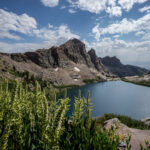
Ruby Mountains, NV – High Route Hike Lamoille Canyon to Seitz Canyon
- Hike Location – Ruby Mountains, Nevada – Ruby Mountains Wilderness
- Land Administration – Humboldt National Forest
- Hike Type – Point to Point
- Fees & Permits – No fees or permits needed
- Start Trailhead – Roads End
- End Trailhead – Powerhouse
- Length Of Time Hiked – 14.5 hours
- Miles Hiked – 19.28
- Route Difficulty – 8
- Scenic Beauty – 9
- Solitude – 9
Video: Ruby Mountains, NV – High Route Hike Lamoille Canyon to Seitz Canyon
Ruby Mountains Hike Maps
Here’s the caltopo map of the Lamoille to Seitz Canyon High Route Hike:
Download GPX file for the Lamoille to Seitz Canyon High Route Hike
Pre-Hike Planning Notes
There are no fees or permits required to hike in the Ruby Mountains. Thomas Canyon and Terraces Campgrounds are available in Lamoille Canyon to camp the night before/after your hike, or simply pull off the road and camp in the National Forest land. You should also be able to camp in a van/camper at the trailhead for one night, there was nobody there to check or bother us. Spring Creek is the nearest anything, and 30 minutes away is Elko which is a big town for Nevada.
This hike is a route that I wanted to do on my 2020 Basin and Range Trail thru hike, but wasn’t able to fit in, logistically. My route along section 6 of the BRT ended at Roads End Trailhead in upper Lamoille Canyon. The route we will hike here is a route that connects upper Lamoille Canyon with Seitz Canyon, leading to the Powerhouse Trailhead in lower Lamoille Canyon. This route should be very scenic, and will offer a spectacular finish to an already great section of the BRT. The Ruby Crest Trail was nice, but I have a feeling this will be nicer.
This route is almost entirely off-trail. There were only a few sections of this route, like in Seitz Canyon, where a trail is marked on the map. On the ground though, it barely existed. Just a fading trail that hasn’t seen maintenance in decades. In other words, most of this route is off-trail, and there is some bushwhacking involved… mostly in Seitz Canyon. With that said, it’s an awesome route that is challenging, rewarding and gets you off the beaten path in the Rubies. The Ruby Crest Trail gets most of the traffic in the Rubies, but there are many other great spots here, such as Echo Lake.
This hike can be done a long day hike, but it would be best to split this hike up into two days, camping at Echo Lake. There are multiple excellent campsites along Echo Lake.
Three final things:
- Beware of the private land at the entrance to Seitz Canyon. That’s why the route goes along the hillside at the end to reach Powerhouse Trailhead. There is an active ranch here with a few homes.
- This hike can be done as a day hike, but it may take all day, as it did for us. Make sure to bring a headlamp, just in case. We wish we did…
- Water is abundant, you won’t hike more than a few miles without it.
July 17th, 2021 – Ruby Mountains, NV High Route Hike Lamoille Canyon to Seitz Canyon
Miles Hiked – 19.28
Elevation Gain – 5,592′
My friends Sam and Ken (2020 CDT thru hikers) will join me for this hike. Last night, we slept off the road in National Forest Land near Camp Lamoille at the entrance to Right Fork Lamoille Creek Canyon. Descent spot, good views of Lamoille Canyon especially at sunset.
In the morning, We drove Ken’s Explorer down to the Powerhouse Trailhead in lower Lamoille Canyon, then drove my van up to Roads End Trailhead in upper Lamoille Canyon. We’ll walk back to Ken’s Explorer today, and then he’ll drive me back up to Roads End to get my van.
We left the trailhead around 8am following a trail up Lamoille Canyon. Soon enough, we realized this one was taking us up to Dollar Lake instead of Lamoille Lake. We began hiking off-trail sooner than anticipated, and headed for a horse trail that runs higher up the hillside in the canyon. I know this, because that’s the route I hiked down from Liberty Pass last year on my BRT thru hike.
The off-trail stuff here was mostly our fault for not taking the horse trail in the first place. I should have known better. Now, we spent some time walking through tall bushes and grasses, thankfully not crazy thick.
We hit the horse trail and followed that a ways uphill. We stopped for a quick break at the spot where we leave the horse trail and begin out hike uphill to our off-trail pass below Snow Lake Peak, leading over to Thomas Canyon.
Sam had just flown to the US from England a few weeks ago, and had bought some cheapo Walmart shirt to hike in for the summer. It was a long sleeved, collared shirt, the kind your cheap dad might wear when he’s forced to dress up. Ok, me too. I joked with Sam about this, and the need for a tie to complete the ensemble. After all, it looked like he was here for a business interview. Well, from the waist up, anyways.
The route up to the pass was steep and had us winded, but it was an easy walk. No bushwhacking, no huge extended boulder fields, it was mostly just a steep incline.
At the top of the pass, we enjoyed great views down into Lamoille Canyon and Thomas Canyon. To the south was Snow Lake Peak. The Snow Lake Peak was eroding was very obvious, and we joked that the Forest Service needed to come out here and “repair” these crumbling mountains. “A few more years and we won’t even have a Snow Lake Mountain”. Ha!
We stopped for a break on the pass, soaked in the excellent views and scouted our next move. The plan was to stay high up on the ridgeline and contour around the mountainside towards Mt Fitzgerald. It looked kinda steep though, and we contemplated taking a route a bit lower, meaning more elevation gain and climbing.
The descent form the pass into Thomas Canyon was steep, but short. Below the pass, a green and grassy patch of land with water flowing through it. A nice hike here.
Next we climbed back up in elevation some to reach our desired contouring line. This was intermittently hard/easy. We’d be climbing up steep, loose rock and boulders one minute, then walking short sections of flat, easy going terrain. All with great views of Thomas Canyon, though.
When we rounded the northwest-facing ridge before Mt Fitzgerald, we were met with an entire mountainside filled with boulders. Not what I like to see, but Sam loves the stuff. It was a big view though over Thomas Canyon. It was very green down below, but we were well above that, in the boulders.
The mountain scenery here was very impressive. The hiking here is more akin to a Sierra High Route or Wind River Range High Route. We are surrounded by towering mountain peaks and rock faces, in a sea of boulders. Slow going, but worth it.
Directly below Mt Fitzgerald was an imposing place to be. The peak towered above us, as we worked our line around the base of it. Even through the boulder fields along the slopes, we routinely cross trickles of water and small streams. There is no shortage of water here.
After Mt Fitzgerald, we went up and over a ridgeline separating Thomas Canyon with Right Fork Lamoille Canyon. The same excellent scenery extends into this canyon as well. Superb views here.
I came across a pile of a few boulders that had some minerals that caught my eye. I’ve been seeing a lot of large books of mica around, but that was it until now. Here though, in upper Thomas Canyon below Mt Fitzgerald, I found garnets. They were embedded in the host rock though, and I couldn’t do much with them without tools to extract them. Still, a cool find. Fun fact, the early explorers who first passed through the Rubies named them the Ruby Mountains because they thought these garnets were actually rubies. And now, I can see why.
Right Fork Lamoille Canyon continued to impress us the entire route around its upper slopes. We have been walking mostly on boulders for quite some time now, though, and it’s tiring.
Eventually, we reached a saddle in between peaks 10,528′ and 10,882′, at the top of Right Fork Lamoille Canyon. The wind was really picking up now. We followed the ridgeline towards No Echo Knob.
Along the way up to the ridgeline, we enjoyed excellent views of the Ruby Mountains. There were some sheer cliffs to stand at the edge of overlooking Right Fork Lamoille Canyon. It looked like the potential for rain now, although nothing directly nearby threatening us at the moment.
At the top of the ridge leading to No Echo Knob was perhaps some of the best distant views of the day. It was our most proper ridgewalk of the day, as well. The views were just stunning in every direction. A truly magical place.
We summited No Echo Knob, high point of the ridge. It was here that Sam, hiking for the first time in Nevada, realized the hidden gem that he’d stumbled upon. “Why is it that so few people visit this place”, he wondered. Nevermind why, we have it to ourselves today.
The descent form No Echo Knob to Echo Lake was outstanding. Echo Lake is hard to ignore; it’s surrounded by a tall, steep cirque of mountains, and the lake itself is a deep blue color. It’s large and looks to be deep. It certainly commands your attention, and respect.
Our original plan was to drop down to the lake to traverse around it’s east shore, but from our elevated position, we saw a better route. We’ll stay higher above the shoreline, and contour around the lake. This way, we minimize our total elevation gain traversing around it. There looks to be a route we can follow, but who knows. Let’s try it!
The entire hike around Echo Lake was stunning. The views were constantly changing, with seemingly better and better angles and lighting. The hike itself wasn’t too hard. There was no real path to follow, but it was easy to pick from numerous lines that traverse the east side of the lake.
The views from the extreme east side of Echo Lake were probably the most impressive to me. Here, the lake looks the biggest, and one has a great view down Echo Canyon. Lining Echo Canyon is Mt Silliman, peak 11,330, and Echo Box Peak. These peaks, and the ridgelines leading up to them, form huge, towering walls above Echo Lake, making this the beautiful place that it is.
We stopped along a small creek for a break. There was a great camp spot here, overlooking Echo Lake. If only we were camping!
After the break, we continued traversing around Echo Lake. Of course, we had to stop and test the echo properties of Echo Canyon at some point. The echo is indeed impressive! We also took the time to test out our skiing skills on some of the snow slopes. I made a successful run down a hundred feet or so, which is always fun to do in shoes.
After contouring around Echo Lake, it was time to head up to a pass below Mt Silliman. From here, it was a climb of about 350′ to the top. It was a very manageable climb up boulders, and we made quick work of this one.
At the top of the pass, we had our first view into Seitz Canyon. Nice, but the north face of Echo Box Peak on the Echo Canyon side was more impressive.
Now for the route down into Seitz Canyon. Our plan was to contour around the north face of Mt Silliman and work our way down a diagonal line Seitz Lake below, avoiding the steep and narrow Seitz Canyon route which is more direct. I thought it would be best to avoid Seitz Canyon when planning this route from home, based on the slope angle shading/steepness of the grade, but now that we’re here, it does indeed look doable. Sam, Ken and I discussed our options, and we settled on the direct route down Seitz Canyon.
So from the top of the pass, it’s 1400ft down this steep, narrow chute filled with snow, ice and boulders. We traversed a sketchy section of loose boulders just to get down to the snow field in the center of the canyon. Past the boulders, we take our first footsteps in the snow. The slope angle is steep, seemingly close to 45 at times. Sam went first, kicking steps on his way down. I went next, and Ken at the top.
The snow was mostly soft enough to kick steps in. Ken and I had the advantage of using Sam’s steps to walk down into, without expending as much energy as Sam. However, it was still slow and tedious. I took out a trekking pole for the first time today, almost never using them anymore, except to support my tent. But here, a trekking pole was great to have. I used my upper hand to balance myself in the snow as I hiked down, which makes your hand quite cold soon enough. So then, I’d switch sides, putting my opposite leg first as the leading leg, giving my other hand a chance to warm up again. Yeah, didn’t think of bringing gloves for this hike. Nor micro spikes or ice axe, but having them here would have been nice.
No way around it, it was slow going down Seitz Canyon. Descending the snow field was enough to get your heart rate up a bit, but also not feel overly worried about the dangers of falling. Maybe that’s just my confidence in the snow. Either way, this slope was not glissade-able… safely.
There were two sets of snow fields in the chute. The upper one was the steepest. There was a short section of boulders separating the two snow fields, and then it was on to descend the lower one. Sam was below and hollered up that it was icier than above. Ken, having hiked with Sam on the CDT in 2020, joked that Sam doesn’t kick great steps anyways. It was fun to see the dynamic between these two, it was the first time I hiked with them together.
Past the second snow field, we were roughly halfway down the chute. It’s all steep boulders here now, and I wondered which I would rather have; the boulders, or the snow. I say, the snow.
We took a break near the bottom of Seitz Canyon, and I ate a snack. I hadn’t eaten in several hours, and really needed the boost. I was indeed feeling better now. We exited Seitz Canyon on a bit of a high, looking back at the increasingly crazier looking chute we had descended. I let out a loud scream into the canyon, which had an incredible echo to it with a delay of a few seconds.
As we covered distance downhill now and entered a flat, open valley above Seitz Lake, we entered a new phase of the hike… bushwhacking. There will be a lot of it in Seitz Canyon, unfortunately. The upper section of the canyon is thick and wet. The views looking back were outstanding, though!
The bushwhacking continued to Seitz Lake. There really wasn’t any good access to Seitz Lake, surprisingly. The shoreline was thick with vegetation. The view sure was nice looking across the lake and up the canyon, though. We assumed the trail would become more obvious downhill from here, but that was wishful thinking.
Below the lake, we continued to be fooled into thinking we had stumbled on the trail every time we came across the slightest hint of a beaten path. However, the setting sun created an extremely pleasant sunset this evening. We had a few sprinkles briefly, but the cloud cover provided the backdrop for those oranges and reds.
We came across a good sized waterfall around the 8200′ mark as we continued to hunt for the trail. We’re right on it according to the map, but we see nothing 95% of the time. It’s a steep descent down the hillside in thick brush. We reach the creek below and stumble upon a ribbon on a tree. You can tell the forest has been cleared out a litter wider in places, but that it’s overgrown for decades without maintenance.
The trail fades in and out and we continue to doubt our ability to stay on whatever the trail is supposed to be. We continue to surprise ourselves though, and routinely see signs that we are on the right path, even if the path is now gone. We saw more ribbons on the trees, scattered randomly along the way, but it’s still a bushwhack.
We hit a creek bed that we followed for a while, which was dry. However, it was full of tress, plants and debris that made this an obstacle course.
Losing light now, Ken stumbles in the thick brush and falls. He’s alright, but a symbol of how were are all feeling… tired. After a helping hand, he’s up and at it again.
Day turns into night as we continue hiking down the canyon. Sam and I have our phones for light, and Ken also has a headlamp. So, one headlamp for the 3 of us. We hit a slightly better path lower down in the canyon, then some type of 4×4 road.
Now we reach the lower reaches of Seitz Canyon, or Rabbit Canyon as the map now marks it here. This is where the private property begins. Following the road out into the valley means walking through private property. There is a ranch here too, and the road goes right behind a couple of homes. So, to avoid them you must contour around the hills above the private property. Fortunately, in the lower reaches of the canyon here, it’s not thick and green, it’s drier and more barren. Open and easier to walk. Still, it’s dark now.
Pick your poison here… walk the hillsides in the dark or drop down to the private property after passing by the homes and walk a nice road out to Lamoille Canyon. I won’t tell you what to do. Just be aware of the property lines, is all. Use the caltopo app and turn on the public lands layer.
We reached Lamoille Canyon sometime around 10:30pm, having hiked a solid two hours in the dark. That’s a 14.5 hour day of hiking for us. It was a very dark night, too. We could barely see Ken’s Explorer until we where right up on it at the Powerhouse Trailhead.
Ken drove us up to the Roads End Trailhead, and we slept in our vehicles for the night. What a killer hike!!
Lamoille to Seitz Canyon Route Verified As New Leg of the Basin and Range Trail
The route we hiked today was challenging, but repeatable. It was not technical nor was there any real exposure. There is plenty of water, excellent camping and outstanding views. Plan to bushwhack Seitz Canyon, though.
So, I am happy to report that the hike we did today will become the new “standard route” for the Basin and Range Trail to end Section 6. The alternate route would be to hike down Lamoille Canyon, or simply hitch down. The route we hiked today was easily equal to the scenery along the Ruby Crest Trail, if not greater. And not only greater scenery, but far more rewarding. Anyone can hike the well-manicured Ruby Crest Trail, but the off-trail stuff we did today provides a greater adventure in my book. The standard BRT route will still hit the Ruby Crest Trail in it’s entirety (except the final mile or two to Roads end trailhead in upper Lamoille Canyon), and so this new route will only enhance the Basin and Range Trail hiking experience.




